Bulk-generate & schedule posts in seconds with Smart Scheduling. Try now!
13 Best Sprout Social alternatives for effective social media management
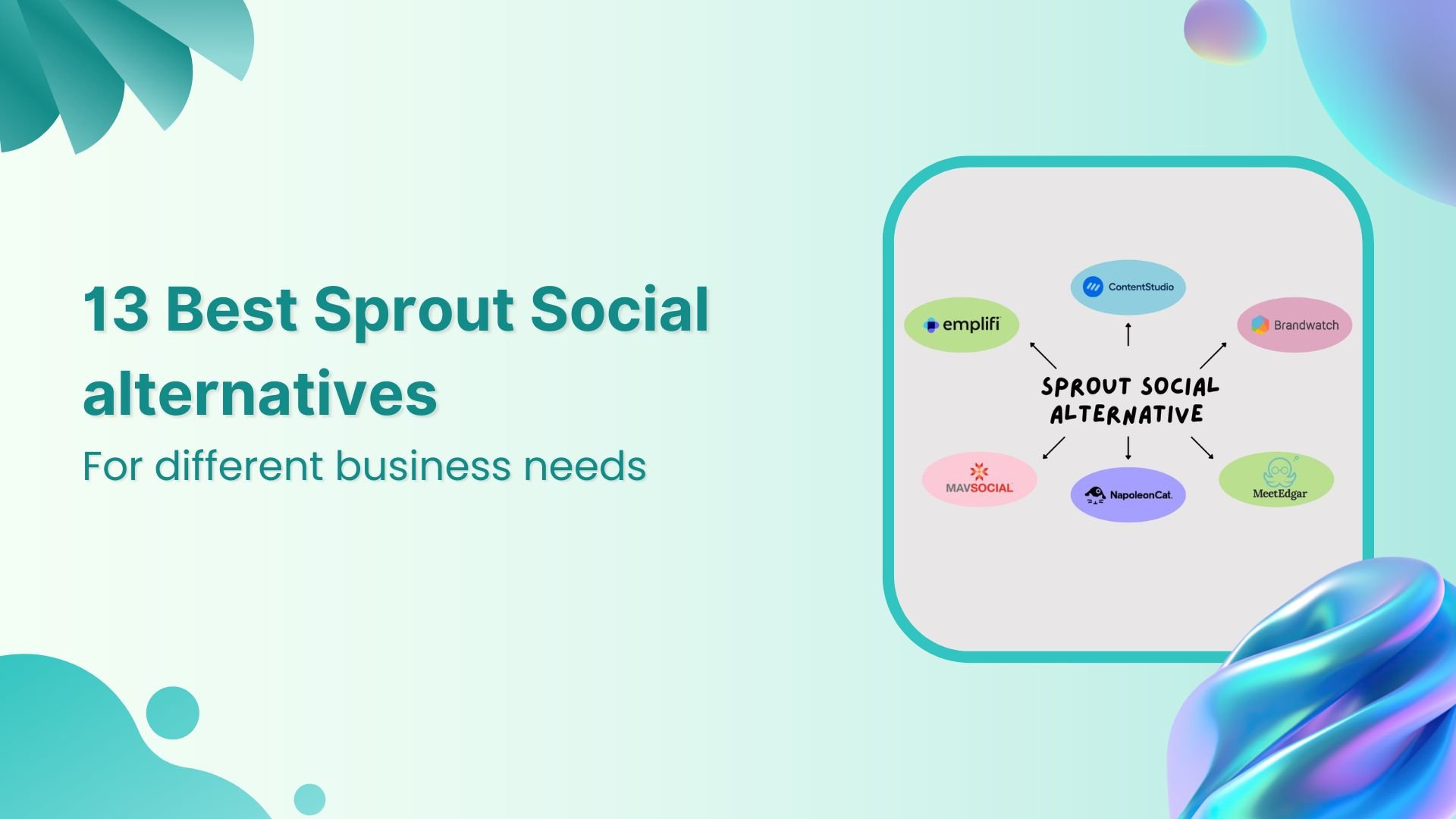
Social media has become the powerhouse of business growth. With billions of active users worldwide, your online presence can make or break your success.
While Sprout Social has been a trusted name, digital trends, and technologies are advancing at breakneck speed. As social media users are set to hit 4.41 billion by 2025, businesses need tools that can keep up with tomorrow’s demands. It’s wise to explore newer alternatives that might better suit your requirements.
But with countless options out there, finding the right fit can be overwhelming. That’s why we’ve compiled this list of the top 13 Sprout Social alternatives for 2025, so you can easily find a tool matching your unique needs.
Simplified social media marketing for individuals & agencies.
Try ContentStudio for FREE
Why should you consider Sprout Social Alternatives
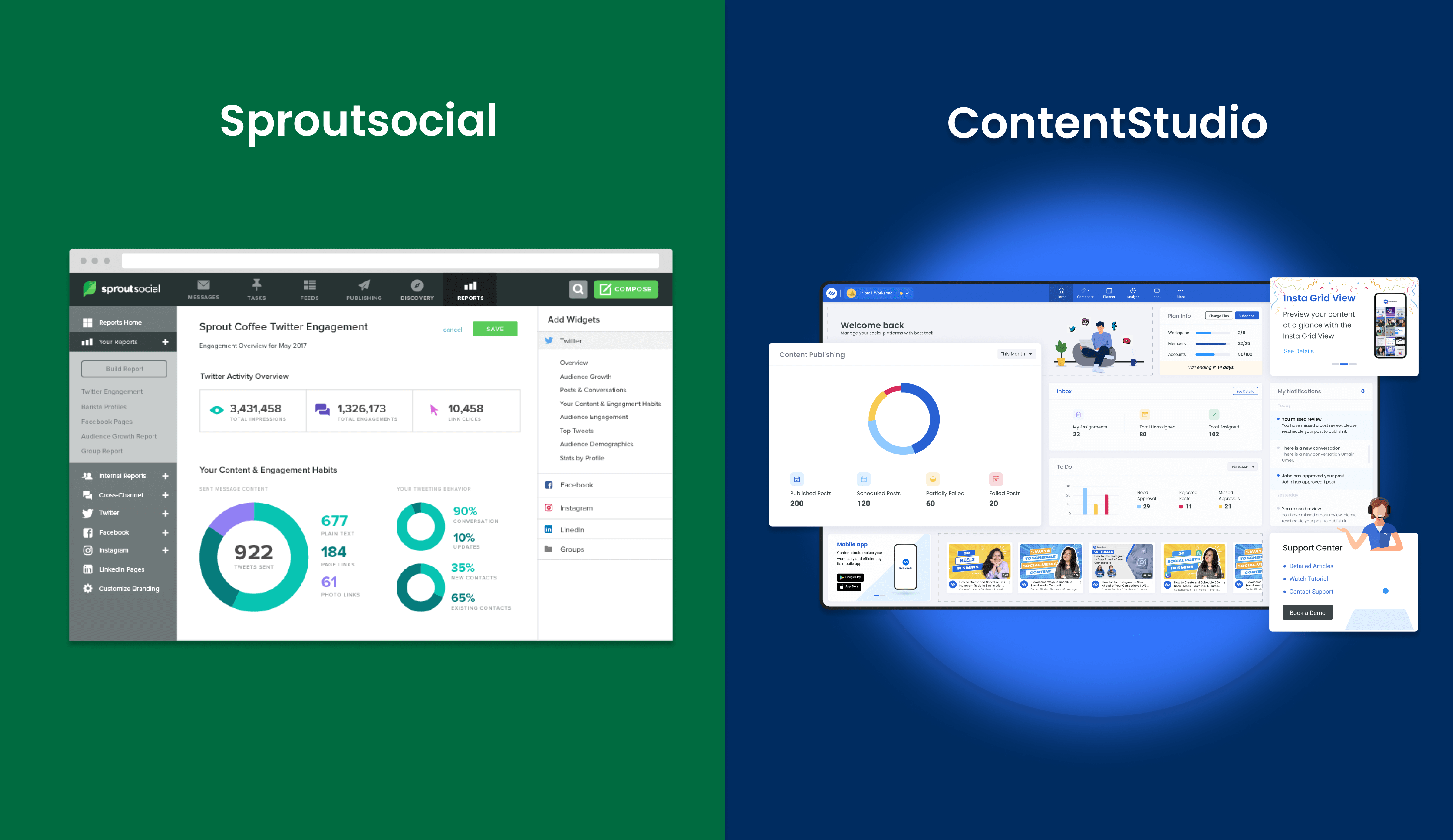
Sprout Social is a robust social media management tool, but some businesses may have better solutions. It’s always a good idea to explore different options that might better fit your unique needs and budget. Here are some key reasons to consider Sprout Social alternatives:
1. High pricing
Sprout Social’s pricing can be a significant barrier, especially for small businesses, startups, and freelancers. With plans starting at $299 per month for a single user, the costs can quickly add up if you need additional users or advanced features. For businesses with limited budgets, finding a tool that offers similar or enhanced features at a lower price point is crucial. For example, ContentStudio provides similar features with pricing starting at $19 per month, making it a cost-effective alternative.
2. Limited features at lower tiers
While Sprout Social offers comprehensive features, many advanced capabilities are restricted to higher-tier plans. For instance, advanced social listening and custom analytics are available only at additional costs, which can be frustrating if you need these functionalities without the hefty price tag. Tools like Brandwatch offer advanced features at more flexible pricing options, making them worthwhile alternatives.
3. Complexity and learning curve
Sprout Social can be challenging to navigate for some users due to its complex interface. Publishing workflows and user tagging processes can be cumbersome, resulting in a steep learning curve and potential inefficiencies. If you’re looking for a more intuitive solution with a smoother user experience, alternatives like Sendible may be easier to use and better suited to your needs.
4. Customization limitations
Although Sprout Social has a solid feature set, it may need more customization than some businesses. Customizable workflows, reports, or UI elements can be crucial for companies looking for a personalized approach to social media management. Tools like ContentStudio provide a higher degree of customization, allowing users to tailor their experience to match their specific workflows and objectives.
5. Customer support delays
Reliable customer support is a critical factor when choosing software. Sprout Social has received mixed reviews regarding customer service, with some users reporting delayed responses. If your business requires quick answers and round-the-clock assistance, consider alternatives like Sendible, which offers 24/7 support via phone, email, and live chat, ensuring that your team gets timely help when needed.
Social Customer Service
Never miss a message or comment from your social media audience. Try ContentStudio’s Inbox.
Get Started for FREE
6. Recent changes in pricing and features
Sprout Social has recently updated its pricing plans, phasing out legacy plans in favor of new ones that include unlimited social profiles but come at a higher cost.
Additionally, new AI-powered tools like Analyze by AI Assist and Summarize by AI Assist have been introduced. While these updates can add value, the higher pricing may not be suitable for everyone. If you’re affected by these changes, exploring more cost-effective options might be beneficial.
With these considerations in mind, it’s clear that Sprout Social may be a better fit for some businesses. Whether due to pricing, limited features, or customization needs, exploring alternatives could lead you to find a tool that’s more in tune with your specific requirements.
No matter your role—be it a small business owner, a marketing professional, or part of a large organization—this guide will help you discover the ideal social media management tool to boost your strategy in 2024. Let’s get started!
| Pros | Cons |
| Ease of use | Scheduling issues |
| Post scheduling | Missing features |
| Social media management | Social media limitations |
| Scheduling | High pricing |
| Analytics | Limited features |
Top Sprout Social alternatives for different business needs

Sprout Social alternative #1: ContentStudio
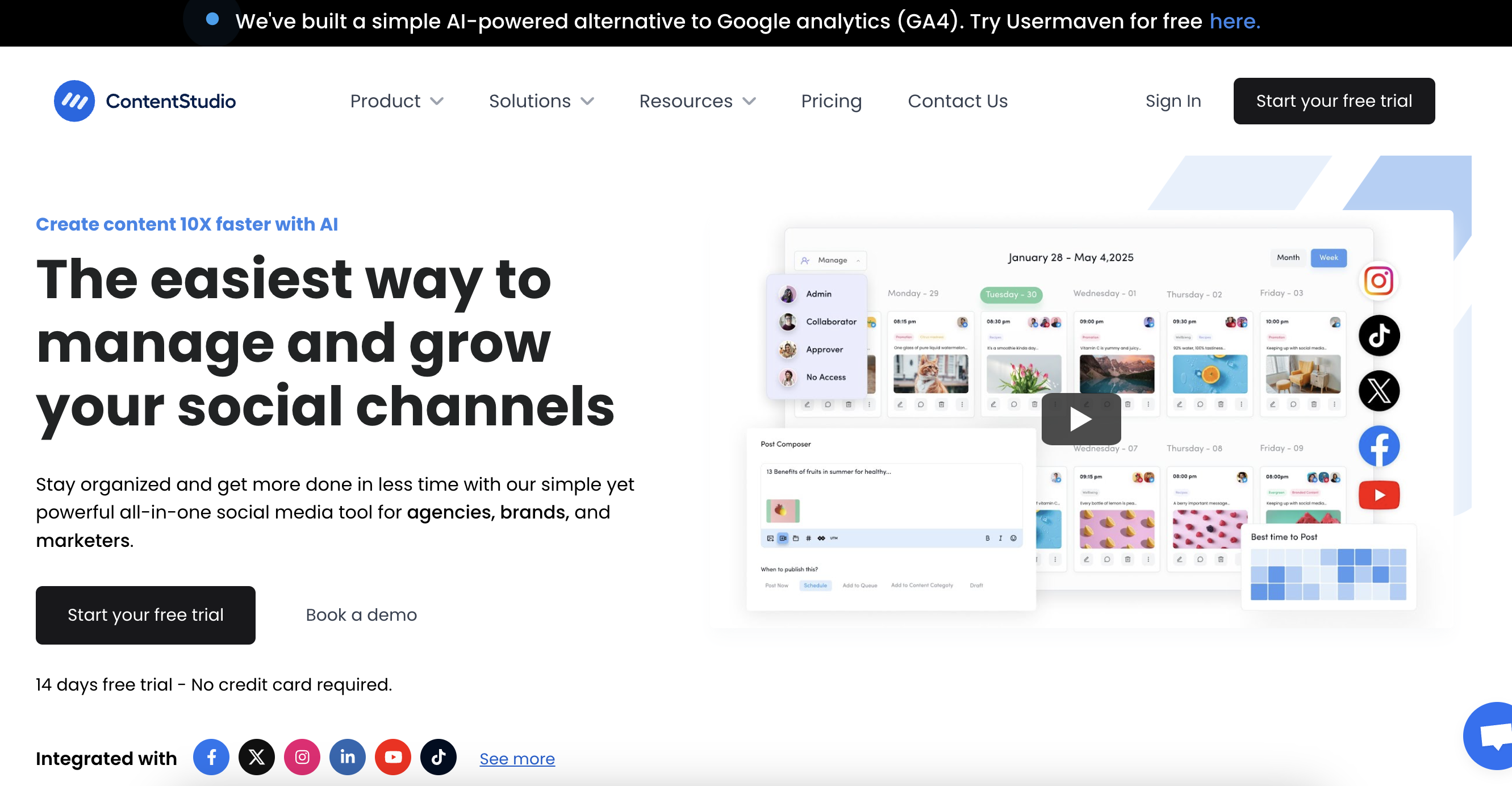
A powerful alternative to Sprout Social
ContentStudio is a highly recommended alternative to Sprout Social, trusted by over 120,000 users worldwide. It stands out not only for its powerful features but also for its competitive and affordable pricing, making it an excellent choice for businesses of all sizes.
Even with a free account, you can create up to 500 posts monthly, and all subscription plans allow for unlimited monthly social media posts, giving you flexibility without breaking the bank.
Key features that set ContentStudio apart
ContentStudio is built to cater to the needs of businesses, influencers, agencies, and larger organizations. It offers a full suite of tools to help you publish, schedule, discover, plan, and analyze social media and blog content.

One key feature is the social Inbox, which consolidates all your social interactions into one centralized location. This makes it easy to manage and respond to customer messages efficiently across different platforms.
Additionally, ContentStudio includes an AI-powered writer to elevate your content creation, making it easy to keep up with the demands of modern social media marketing.
ContentStudio integrates seamlessly with over 30 platforms, including social media channels, content creation tools, and publishing services, giving you complete control over social publishing through approval workflows. Here are some of the standout features that make ContentStudio a top alternative:
Social Media Content Calendar
Stay consistent and organized with Contentstudio’s social media content calendar for marketers and agencies.
Get Started for FREE
| Top features at a glance | |
| Social media scheduling and publishing | Social media automation |
| AI writer for content creation | Audience tracking |
| Analytics and reports | Content approval workflow |
| Influencer search | Custom publishing queues |
| Content calendar | Client workspaces |
| Task management and team collaboration | Multi-channel analytics |
| Competitor analytics | Social inbox for customer engagement |
| AI caption generator | RSS feed reader |
| Content discovery | Best time to publish insights |
Related read: Master social media with advanced features
Supported social channels
ContentStudio supports a wide range of social channels, including:
Social media platforms
Platform integrations
ContentStudio’s diverse integrations include:
Platform integrations
Free tools available
ContentStudio offers a range of free tools that add significant value to your social media management experience:
Free AI tools
Related read: ContentStudio’s free tools fuel your social media success.
| Pros | Cons |
| Ease of use | API compatibility |
| Content creation | Content discovery |
| Social media management | AI limitations |
| AI social toolkit | – |
| Content calendar | – |
Pricing
ContentStudio offers competitive pricing options to meet various business needs:
- Standard Plan: $19 per month (or $228 annually), ideal for small teams managing up to 5 social accounts. It includes key features like AI content creation, publishing, scheduling, and social media analytics.
- Advanced Plan: $49 per month (or $588 annually), supporting up to 10 social accounts, 2 workspaces, and 2 users. It offers advanced tools such as a social inbox, competitor analytics, campaign and label analytics, and evergreen content recycling.
- Agency Unlimited Plan: Starting at $99 per month, it supports 25 social accounts, unlimited workspaces, and unlimited users. Additional accounts can be added with tiered discounts, making it a scalable solution for growing agencies.
ContentStudio vs. Sprout Social
- AI-powered features: ContentStudio includes a suite of AI tools (AI writer, caption generator, hashtag generator) to simplify content creation and optimization. This focus on AI distinguishes it from Sprout Social, which emphasizes analytics more than content creation support.
- Content scheduling & automation: ContentStudio offers robust scheduling options (optimal posting, custom queues, multi-channel automation) that streamline social media operations for brands. While Sprout Social has good scheduling, it lacks the same depth in automation and custom workflows.
- Social Inbox & engagement: ContentStudio’s Social Inbox consolidates messages across platforms, making it efficient for high-volume interactions. Sprout Social has similar features, but ContentStudio’s seamless interface and broad integration provide an edge for engagement management.
- Collaboration & approval workflows: Both tools support content approval workflows, but ContentStudio’s client workspaces and task management features make it more flexible, particularly for agencies handling multiple clients. Sprout Social’s workflows, while effective, are less agency-oriented.
- Platform support: ContentStudio supports a wider range of platforms (YouTube, TikTok, Pinterest, Medium) beyond the basics like Facebook, Instagram, and LinkedIn, making it ideal for brands wanting broader reach.
- Analytics & reporting: ContentStudio offers multi-platform analytics with insights on engagement, available on all plans. Sprout Social’s advanced analytics are only available on higher-tier plans, which may not be accessible to smaller teams.
- Free tools: ContentStudio provides free tools (AI Caption Generator, Hashtag Generator, Keyword Generator) that add value to content discovery. Sprout Social doesn’t offer similar free tools, making ContentStudio more budget-friendly.
Quick takeaway
Why Choose ContentStudio?
ContentStudio offers a comprehensive social media management solution with AI-powered tools, unlimited posting, and integration with 30+ platforms—all at an affordable price. It stands out with features like:
- A centralized Social Inbox for seamless communication.
- Extensive automation options to save time and streamline workflows.
- White-label solutions enable agencies to provide a great branded experience to clients without third-party marks, boosting credibility and creating a seamless user experience.
With pricing starting at $19 per month, ContentStudio is a cost-effective alternative to Sprout Social for businesses of all sizes.
G2 rating
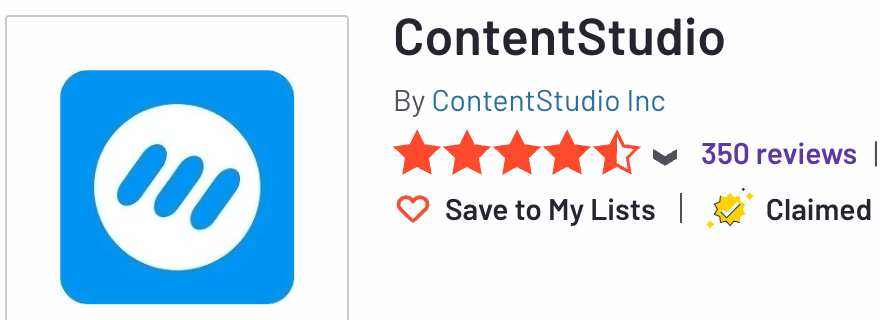
Sprout Social alternative #2: Hootsuite
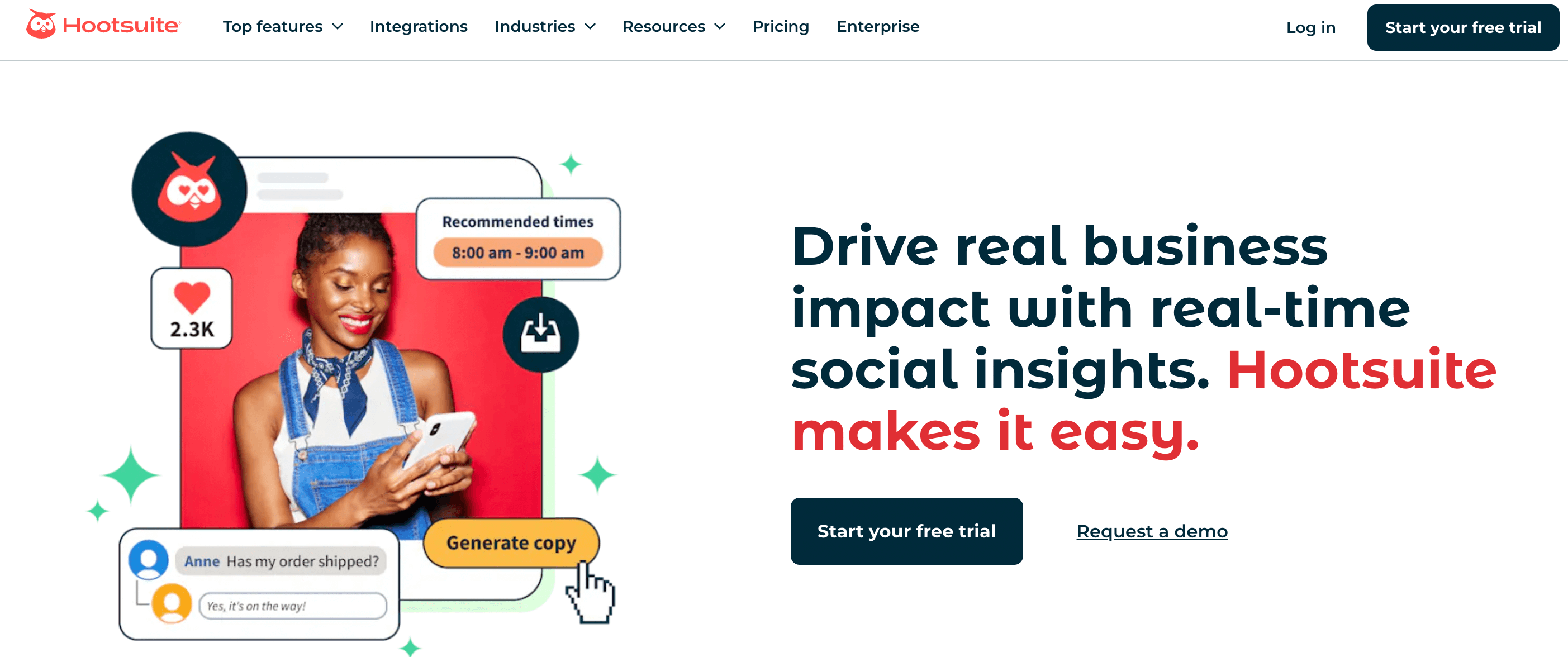
Hootsuite is a well-established social media management tool offering a comprehensive range of features, making it a reliable alternative to Sprout Social. It serves as an all-in-one platform providing social scheduling, competitor analysis, social listening, advertising, and advanced analytics, along with a centralized social inbox to efficiently manage your social interactions.
Also Read: 15 Best Hootsuite Alternatives for Marketing Agencies
Whether you need to schedule posts across multiple channels, monitor brand mentions, run advertising campaigns, or analyze social media performance, Hootsuite offers the tools to do it all in one streamlined solution, making it a popular choice for businesses of all sizes.
Top features at a glance
| Features | |
| Social scheduling and publishing | Competitor analysis |
| Social listening | Advertising |
| Social analytics | Centralized inbox for social interactions |
Supported social channels
Hootsuite supports a wide range of social media channels, including:
Social media platforms
Platform integrations
Hootsuite offers numerous integrations to help streamline your marketing efforts:
Platform integrations
| Pros | Cons |
| Ease of use | Scheduling issues |
| Post scheduling | Missing features |
| Social media management | Social media limitations |
| Scheduling | High pricing |
| Centralized management | Expensive |
Pricing
- Professional: $99 per user per month (monthly billing), with 1 user and 10 social accounts
- Team: $249 per user per month (monthly billing), with 3 users and 20 social accounts
- Business: $739 per user per month (monthly billing), with 5 users and 50 social accounts
Hootsuite vs. Sprout Social
- Reporting & Analytics: Sprout Social offers advanced analytics with competitor benchmarking, while Hootsuite provides customizable, user-friendly reports suited for basic insights.
- Content Suggestions: Both platforms provide content ideas; Sprout Social tailors suggestions based on trends, while Hootsuite offers a simpler suggestion tool integrated with scheduling.
- Social Listening: Hootsuite includes social listening in its entry-level plan, whereas Sprout Social’s listening tools are more advanced but at a higher cost.
- Pricing: Hootsuite starts at $99/month for essential tools, making it affordable, while Sprout Social’s more feature-rich plan starts at $249/month, geared towards larger teams.
- User Interface: Sprout Social is known for its polished and intuitive design, while Hootsuite’s dashboard is more straightforward and has been refined for ease of use.
Quick takeaway
Hootsuite offers a comprehensive social media management platform with features like scheduling, analytics, and social listening starting at $99/month. While it provides a more straightforward and budget-friendly alternative to Sprout Social, it comes with some limitations in scheduling and advanced features, making it best suited for small to medium-sized businesses seeking essential social media management tools.
G2 rating

Sprout Social alternative #3: Planable
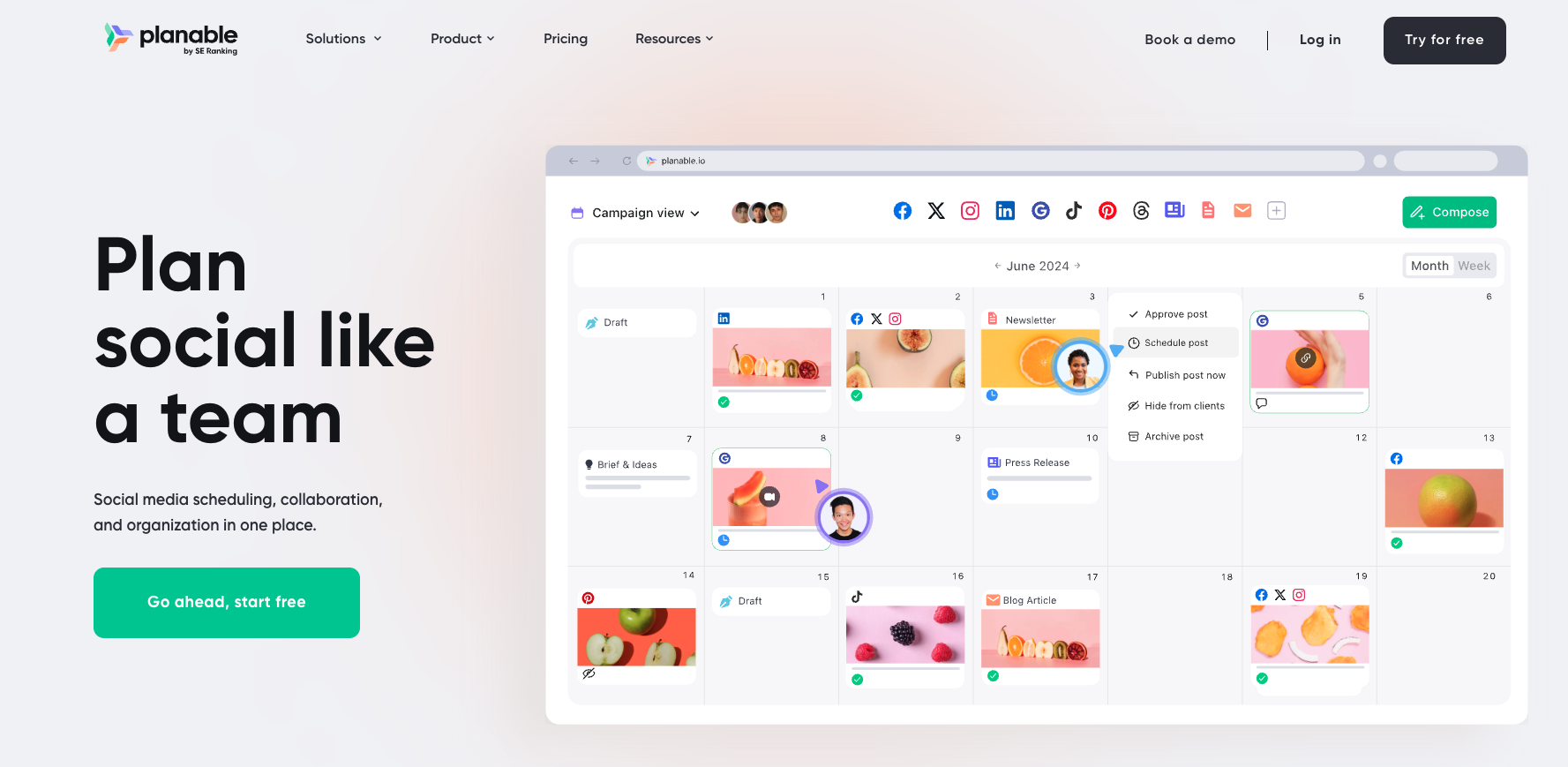
Planable is a social media management tool built for teams and agencies that need streamlined collaboration and approval workflows. The platform combines scheduling and publishing capabilities with visual content planning across all major social platforms.
The tool’s main strength is its multi-level approval system and real-time collaboration features. Team members can comment directly on posts, tag colleagues, and track feedback without switching between tools or losing context. The visual interface displays content as it will appear on each platform, which helps teams working with clients or stakeholders who need to review posts before they go live.
Planable works well for agencies managing multiple clients, marketing teams coordinating with stakeholders, and brands that require structured approval processes. The platform includes features like guest links for external collaborators, campaign organization tools, and a media library for asset management.
Top features at a glance
| Features | |
|---|---|
| Social scheduling and publishing | Visual content planning (Calendar, Grid, Feed, List) |
| Multi-level approval workflows | Instagram grid preview |
| Real-time collaboration and comments | Campaign organization |
| Auto-scheduling upon approval | Analytics and branded reports |
| Guest links for external stakeholders | In-app image editing |
| Media Library and asset management | Mock-up pages for content preview |
Supported social channels
Planable supports a wide range of social media channels, including:
| Social media platforms | |
|---|---|
| Twitter (X) | |
| TikTok | YouTube |
| Google Business Profile | |
| Threads | |
Platform integrations
Planable offers key integrations to help streamline your marketing efforts:
| Platform integrations | |
|---|---|
| Canva | Google Drive |
| Slack | |
| Pros | Cons |
|---|---|
| Approval workflows | Post limits on lower tiers |
| Visual interface | No DM management |
| Real-time collaboration | Limited social inbox features |
| Multi-platform syncing | No competitor tracking |
| Client-friendly sharing | |
| Intuitive design | |
| Quality preservation |
Pricing
- Free trial: All features unlocked with 50-post cap
- Paid plans: Start at $33/month
Planable vs. Sprout Social
- Primary Focus: Planable emphasizes collaboration and approval workflows, perfect for agencies and marketing teams working with stakeholders, while Sprout Social offers a full-featured social media suite with strong social listening and inbox management.
- Publishing & Scheduling: Both excel at scheduling, but Planable’s visual interface and multi-level approval system make it superior for teams that need content sign-off before publishing.
- Analytics: Sprout Social provides more advanced analytics with competitive insights and audience analysis, whereas Planable focuses on essential performance metrics and branded client reporting.
- Collaboration Tools: Planable’s collaboration is built around real-time comments, approvals, and guest links for external stakeholders, while Sprout Social focuses more on team task management and social inbox organization.
- Engagement Tracking: Sprout Social offers comprehensive engagement features with a centralized inbox for customer conversations, while Planable’s engagement tools are more limited and focused on content planning rather than community management.
- Pricing: Planable starts at $33/month for unlimited users, making it more accessible for teams; Sprout Social’s higher pricing ($249/month) reflects its broader feature set including social listening and robust analytics.
Quick takeaway
Planable offers a collaboration-first social media management solution with pricing starting at $33/month, focusing on visual content planning, multi-level approvals, and stakeholder collaboration. While it excels in eliminating approval chaos and making teamwork seamless, it lacks social listening, DM management, and competitor tracking features, making it best suited for agencies and marketing teams that prioritize content creation and approval workflows over community management.
G2 rating
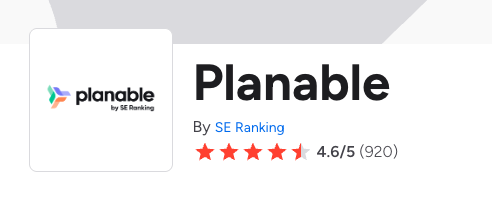
Sprout Social alternative #4: Buffer
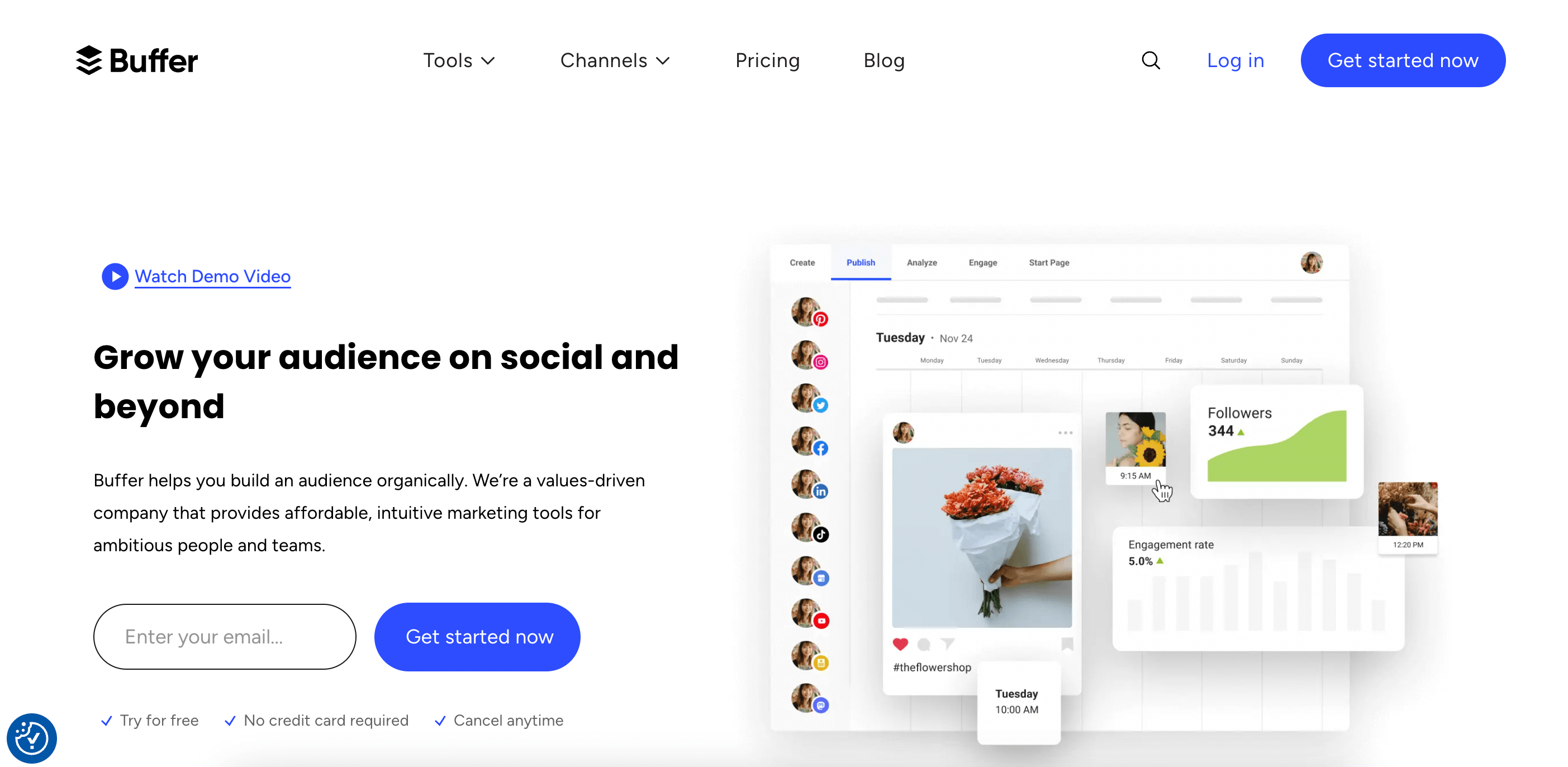
Buffer‘s suite of products is designed with simplicity in mind, offering a collaborative environment that empowers marketers and teams to streamline social media efforts. It enables seamless publishing across all major social platforms while focusing on user-friendly functionality.
Related read: Top 22 Buffer alternatives for marketing agencies
It’s recent updates include advanced analytics tools and improved engagement tracking, making it an excellent choice for small businesses and startups prioritizing ease of use without sacrificing essential capabilities. It stands out for its affordability and dedication to effective social media management, offering essential tools for publishing, tracking, and optimizing campaigns.
| Top features | |
| Publishing and scheduling | Engagement |
| Campaign planning | Campaign optimization |
| Content calendar | Multi-account management |
| Advanced analytics | Centralized inbox |
| Collaboration tools | |
Supported social channels
Buffer supports a wide range of social media channels, including:
Social media platforms
Platform integrations
Buffer offers numerous integrations to help streamline your marketing efforts:
Platform integrations
| Pros | Cons |
| Social media integration | Scheduling issues |
| Post scheduling | Limited features |
| Social media management | Social media limitations |
| Analytics focus | High pricing |
| Multiple accounts | Instagram limitations |
Pricing
- Essential plan: $5/month per channel, 1 user account, AI assistance, and advanced analytics (14 days FREE Trial)
- Team plan: $10/month per channel with unlimited scheduled posts, AI assistant and advanced analytics. (14 days FREE Trial)
Buffer vs. Sprout Social
- Primary Focus: Buffer emphasizes simplicity and ease of use, perfect for small businesses, while Sprout Social offers a full-featured social media suite tailored for larger teams and agencies.
- Publishing & Scheduling: Both tools excel at publishing and scheduling across major platforms, but Buffer’s straightforward interface is more suited for those who prioritize ease and efficiency.
- Analytics: Sprout Social provides advanced analytics with competitive insights and audience analysis, whereas Buffer has recently enhanced its analytics, focusing on essential metrics for small teams.
- Engagement Tracking: Sprout Social offers comprehensive engagement features, including a centralized inbox for handling all interactions, while Buffer’s engagement tracking is focused and efficient, though less robust.
- Collaboration Tools: Buffer’s collaborative environment is designed for small teams needing simple workflows, while Sprout Social provides more detailed user roles and permissions, making it better for larger teams.
- Pricing: Buffer is more affordable, with plans starting at $5/month per channel, catering to startups and small businesses; Sprout Social’s higher pricing reflects its advanced features and is suited for agencies and larger teams.
Quick takeaway
Buffer offers a straightforward social media management solution with pricing starting at $5/month per channel, focusing on essential features like publishing, scheduling, and basic analytics. While it excels in user-friendly design and affordability, it may have limitations in advanced features and Instagram functionality, making it best suited for small businesses and startups seeking simplicity over complexity.
G2 rating

Sprout Social alternative #5: Later
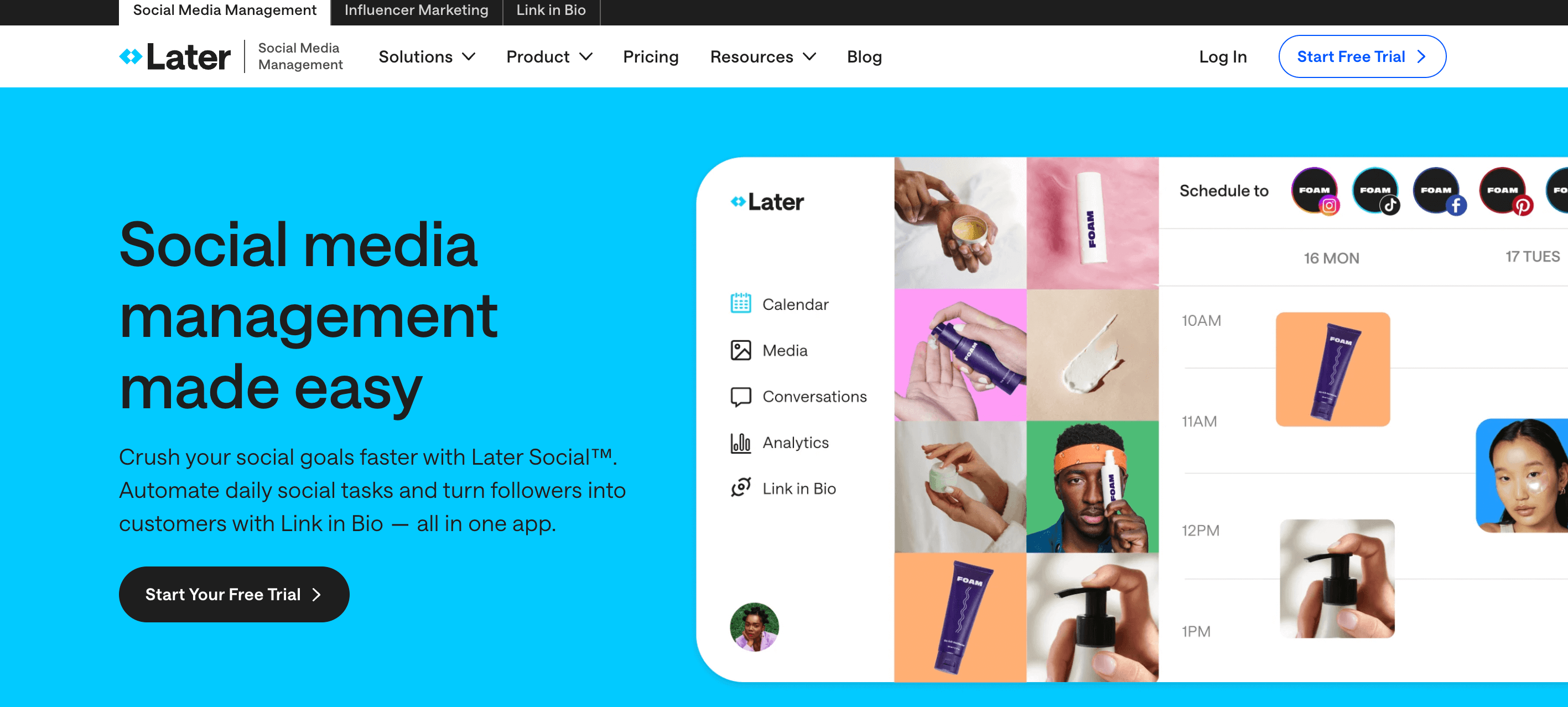
Later has expanded beyond Instagram scheduling and now offers scheduling for other major social media platforms such as LinkedIn, TikTok, Pinterest, Facebook, and Twitter. This expansion makes Later an excellent alternative to Sprout Social for those prioritizing visual marketing, offering a user-friendly interface and specialized tools to enhance content creation and engagement.
Also Read: Keeping Up With Social Media Image Sizes in 2024
Beyond simply scheduling branded content, it provides the ability to share user-generated content (UGC) effortlessly, which is particularly beneficial for brands that rely heavily on UGC for promotion. Additionally, Later has added new tools, such as an AI-powered caption writer and enhanced analytics to help marketers plan, execute, and optimize their campaigns more easily.
| Top features | |
| Social media scheduling | Visual Instagram planner |
| Hashtag suggestions | Linkin.bio |
| Content creation | AI-powered caption writer |
| Analytics | Centralized inbox |
Supported social channels
Later supports a wide range of social media channels, including:
Social media platforms
Platform integrations
Later offers numerous integrations to help streamline your marketing efforts:
Platform integrations
| Pros | Cons |
| Ease of use | Scheduling issues |
| Post scheduling | Missing features |
| Social media management | Plan limitations |
| Scheduling | High pricing |
| Time saving | Lack of analytics |
Pricing
- Starter: $16.67/month (Billed yearly), 1 social Set (9 profiles total), and 1 user
- Growth: $30/month (Billed yearly), 3 social Sets (27 profiles total), and 3 users
- Advanced: $53.33/month (Billed yearly), 6 Social Sets (54 profiles total), and 6 users.
- Agency: $133.33/month(Billed yearly), 15 Social Sets (135 profiles total) and 10 users.
Later vs. Sprout Social
- Primary Focus: Later is tailored for visual social media, particularly Instagram, whereas Sprout Social is a full-featured social media management tool suitable for multiple platforms.
- Content Scheduling: Both Later and Sprout Social offer scheduling capabilities, but Later’s drag-and-drop calendar and visual planner make it especially popular for Instagram-first creators.
- Analytics: Sprout Social provides more comprehensive analytics across platforms, while Later’s analytics focus on Instagram metrics, making it best for brands centered on visual engagement.
- Smart Recommendations: Both tools offer smart recommendations for optimal posting times, though Sprout Social’s suggestions are based on more advanced engagement data across multiple channels.
- Pricing: Later is more affordable, with plans that cater to individual creators and small teams, while Sprout Social’s higher pricing is geared toward larger teams needing advanced features.
- User Experience: Later is known for its intuitive, visual-friendly interface tailored for content creators, whereas Sprout Social provides a polished, business-oriented dashboard ideal for professional teams.
Quick takeaway
Later specializes in visual-first social media management, focusing on Instagram. It offers features like visual planning, an AI caption writer, and scheduling across major platforms starting at $16/month. While it excels in visual content management and user-friendly design, it has some limitations in analytics and scheduling features, making it most suitable for visual content creators and Instagram-focused brands.
G2 rating
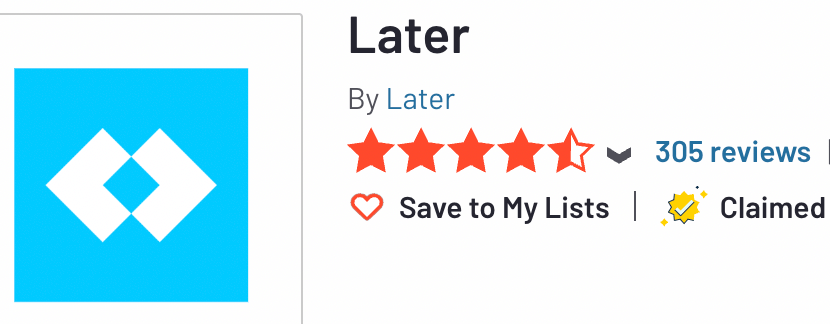
Sprout Social alternative #6: NapoleonCat
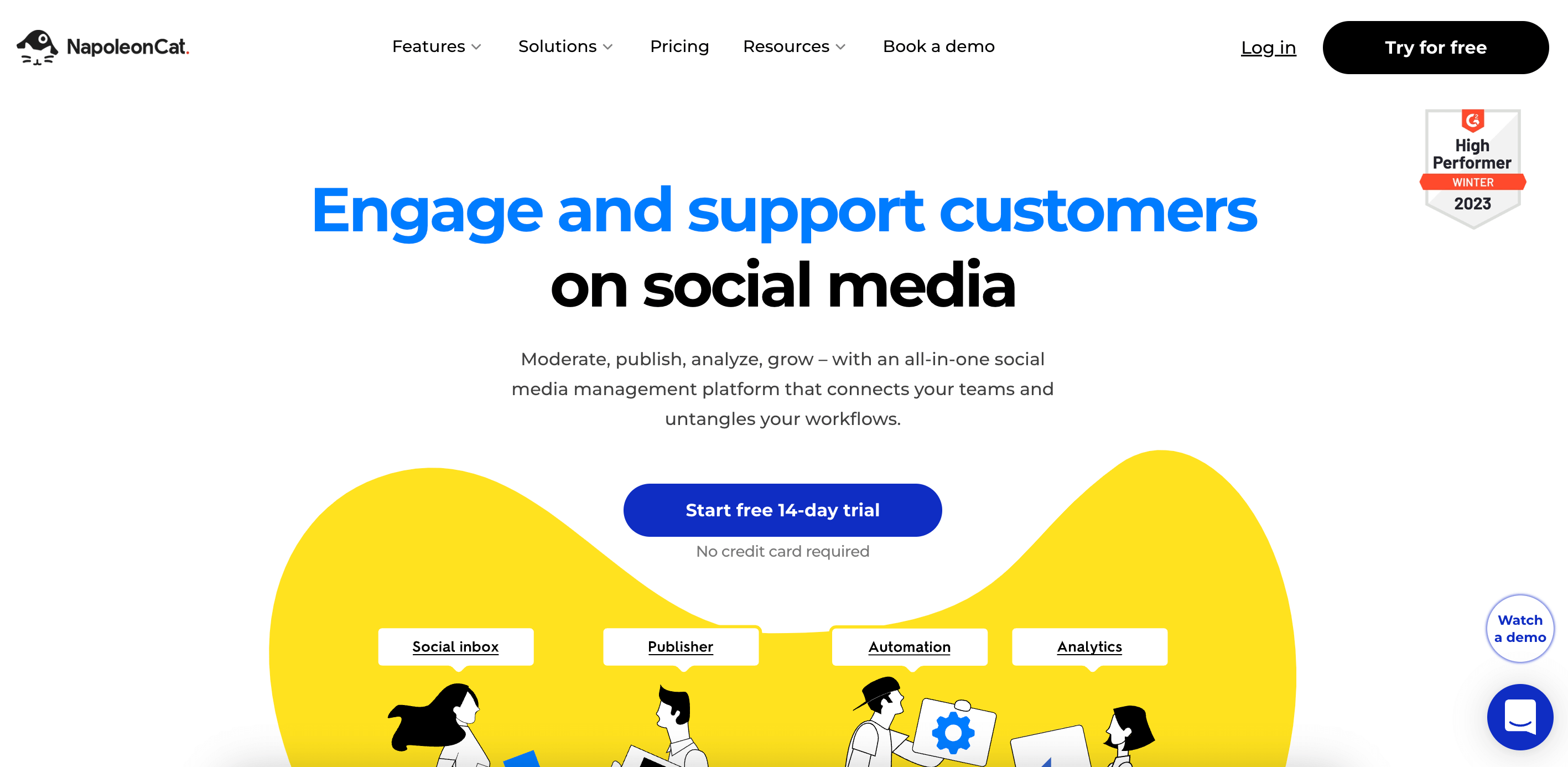
NapoleonCat stands out as a robust Sprout Social alternative in 2024, offering comprehensive social media management tools for businesses of all sizes. While providing core functionalities like publishing, reporting, and listening, it distinguishes itself with AI-powered content suggestions, advanced team collaboration, and a new crisis management module.
Recent enhancements include optimized scheduling and expanded integrations with YouTube and Shopify. With competitive pricing and regular updates, NapoleonCat delivers a powerful, user-friendly solution for streamlining social media management across multiple platforms, making it an attractive option for businesses, agencies, and individuals seeking versatility and cost-effectiveness.
| Features | |
| AI-powered content suggestions | Scheduling |
| Team collaboration | Advanced competitor monitoring |
| Comprehensive reporting and analytics | Unified social inbox |
| Social media crisis management module | |
Supported social channels
NepoleonCat supports a wide range of social media channels, including:
Social media platforms
Platform integrations
NepoleonCat offers numerous integrations to help streamline your marketing efforts:
Platform integrations
| Pros | Cons |
| Ease of use | Slow loading |
| Customer support | Slow performance |
| Features | Bugs |
| Helpful | Missing features |
| Centralized management |
Pricing
- Standard: $27 monthly with 3 profiles, 1 user, AI-powered content publisher, comments management, and data analytics
- Pro: $63/month with 3 profiles, 1 user and automated moderation, TikTok ads moderation and social CRM
- Enterprise: Personalized solutions for your specific business needs. Starts from $465 /mo.
NapoleonCat vs. Sprout Social
- Core Focus: NapoleonCat offers a versatile, cost-effective solution for businesses of all sizes, while Sprout Social provides a comprehensive suite for larger teams and agencies.
- Content Suggestions: NapoleonCat uses AI-powered content suggestions to aid in content creation, while Sprout Social provides general content recommendations across multiple platforms.
- Crisis Management: NapoleonCat includes a crisis management module for handling sensitive situations—a feature Sprout Social lacks.
- Unified Social Inbox: Both tools offer a unified social inbox, but NapoleonCat enhances it with automated moderation, beneficial for managing high engagement.
- Team Collaboration: NapoleonCat supports real-time commenting for collaboration, while Sprout Social offers more advanced user roles, suited to larger teams.
- Pricing: NapoleonCat starts at $27/month, making it more budget-friendly, while Sprout Social’s higher pricing reflects its advanced analytics and user management capabilities.
Quick takeaway
NapoleonCat offers a comprehensive social media management solution starting at $27/month, featuring AI-powered content suggestions, crisis management, and automated moderation. While it provides strong team collaboration and customer support, users may experience some performance issues and software glitches, making it best suited for businesses seeking a balance between advanced features and affordability.
G2 rating
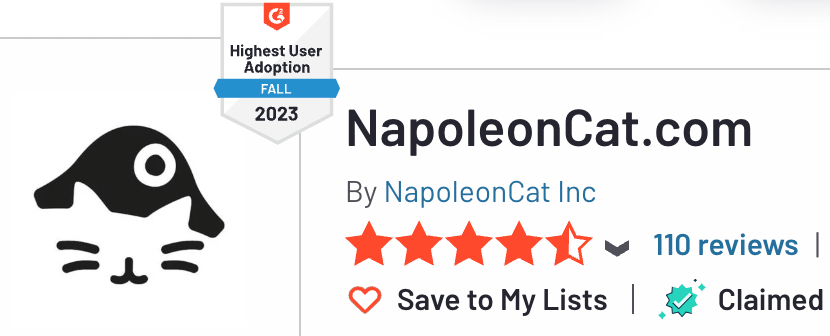
Sprout Social alternative #7: MeetEdgar
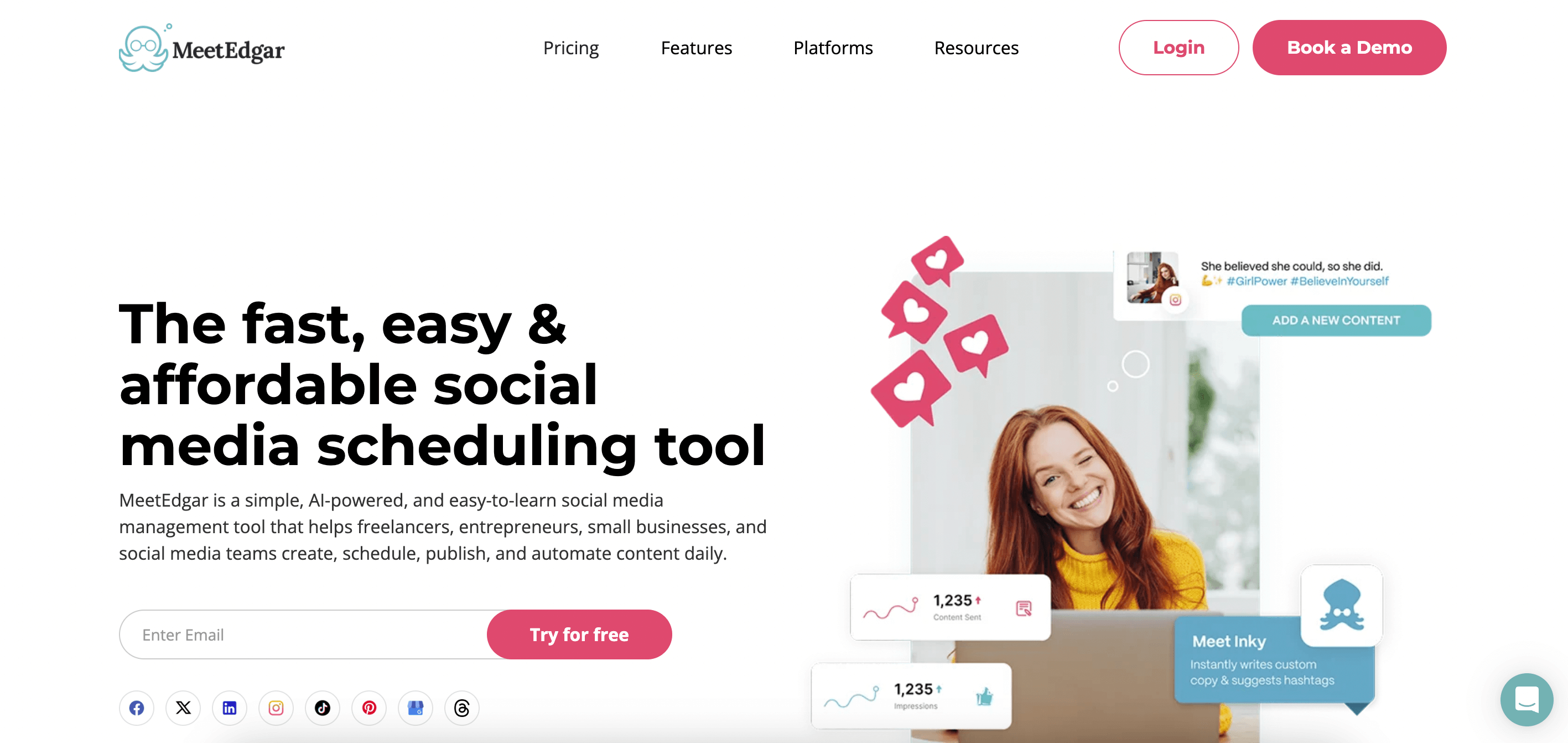
MeetEdgar has established itself as a powerful Sprout Social alternative. It offers an intuitive platform that simplifies social media management through intelligent automation. Its standout feature is the ability to repurpose and schedule content, ensuring consistent activity across social channels even during content lulls.
P.S. Looking for MeetEdgar alternatives?
In 2024, MeetEdgar introduced an AI-powered content suggestion tool, enhancing its automation capabilities. The platform now offers improved analytics, providing deeper insights into content performance and audience engagement.
| Features | |
| AI-powered content suggestions | Smart content recycling and scheduling |
| Category-based social posting | Automated content curation |
| Advanced analytics and reporting | Team collaboration tools |
| URL shortening and tracking | |
Supported social channels
MeetEdgar supports a wide range of social media channels, including:
Social media platforms
Platform integrations
MeetEdgar offers numerous integrations to help streamline your marketing efforts:
Platform integrations
| Pros | Cons |
| Automation benefits | Contact management |
| Content creation | Limited customization |
| Customer service | Layout issues |
| Helpfulness | High pricing |
| Intuitive interface | Limited features |
Pricing
- Eddie Plan (for starters): $24.91/month, 5 accounts, unlimited, and weekly automation.
- Edgar Plan (for growing businesses): $41.58/month with 25 social accounts and unlimited content categories.
MeetEdgar vs. Sprout Social
- Content Repurposing: MeetEdgar focuses on smart content recycling and automated scheduling to ensure consistent posting, while Sprout Social offers traditional scheduling without automated recycling.
- Content Suggestions: Both platforms offer content suggestions, but MeetEdgar’s AI-powered tool, introduced in 2024, emphasizes automation and efficiency for smaller teams.
- Analytics: Sprout Social provides comprehensive analytics with competitor insights and audience data, whereas MeetEdgar’s analytics focus on content performance and engagement metrics, ideal for basic reporting needs.
- User Experience: MeetEdgar’s intuitive, user-friendly design is suited for small to medium businesses, while Sprout Social’s interface supports more advanced team management, fitting larger teams and agencies.
- Pricing: MeetEdgar is more budget-friendly, with plans starting at $29.99/month, appealing to solopreneurs and small businesses; Sprout Social’s higher pricing reflects its advanced suite and is aimed at larger teams.
- Platform Integrations: MeetEdgar integrates with tools like Zapier, WordPress, and Canva, making it ideal for content curation, while Sprout Social provides integrations that support CRM and analytics tools for in-depth social media insights.
Quick takeaway
MeetEdgar offers an automated social media management solution starting at $29.99/month, specializing in smart content recycling and AI-powered content suggestions. While it excels in automation and provides an intuitive interface with good customer service, it has limitations in customization and features, making it ideal for small businesses and solopreneurs who prioritize consistent content scheduling over advanced analytics.
G2 rating
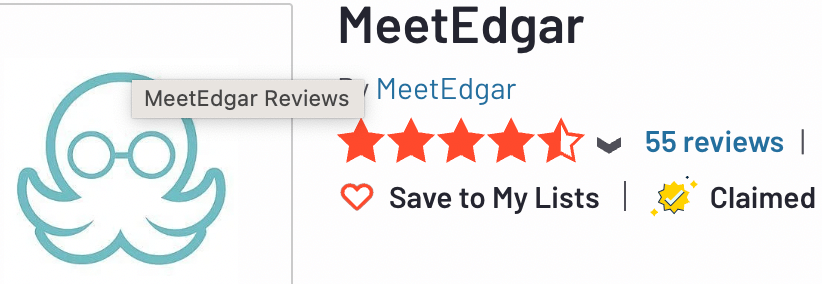
Sprout Social alternative #8: Brandwatch
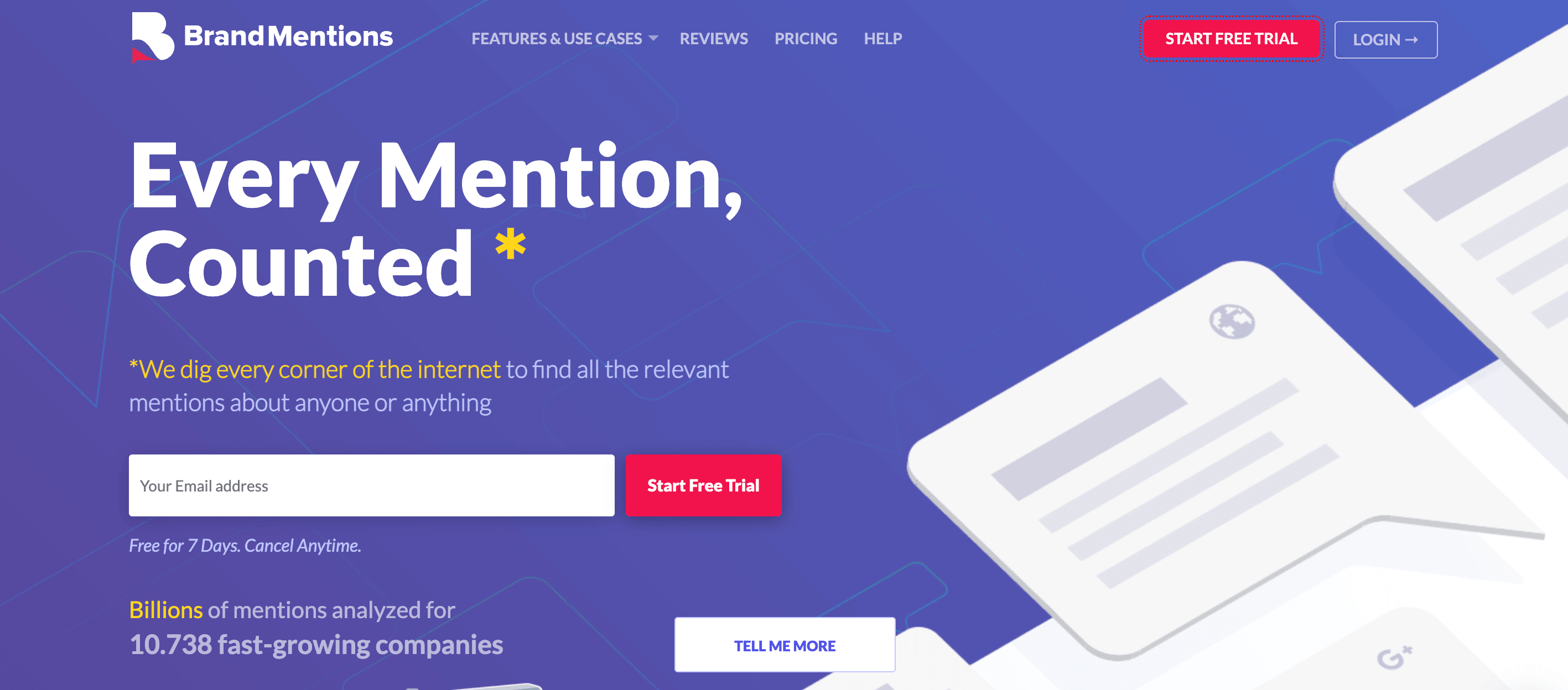
Brandwatch has evolved into a comprehensive social media intelligence platform, offering more than just management tools. In 2024, it solidified its position as a top Sprout Social alternative by introducing AI-driven insights and predictive analytics.
Brandwatch’s strength lies in its advanced social listening capabilities, which now include sentiment analysis in over 50 languages. The platform has expanded its content management features, introducing an AI-assisted content creation tool that helps brands maintain a consistent voice across channels. Its collaborative calendar and cross-channel inbox have been enhanced with automated workflow features, streamlining team processes and improving response times.
| Features | |
| AI-driven market research and trend forecasting | Advanced brand management with real-time alerts |
| AI-assisted content creation and scheduling | Collaborative calendar with automated workflows |
| Unified cross-channel inbox with priority sorting | Automated response suggestions |
| Deep-dive social listening with multilingual sentiment analysis | Comprehensive analytics with custom reporting |
Supported social channels
Brandwatch supports a wide range of social media channels, including:
Social media platforms
Platform integrations
Brandwatch offers numerous integrations to help streamline your marketing efforts:
Platform integrations
| Pros | Cons |
| Ease of use | Improvement needed |
| Social media management | Missing features |
| Helpful | Lack of features |
| Analytics | Limited features |
| Centralized management | Scheduling issues |
Pricing
- Consumer Intelligence Suite: Custom pricing
- Social Media Management: Custom pricing
- Influencer Marketing: Custom pricing
- Enterprise Solutions: Custom pricing, including all features
Brandwatch vs. Sprout Social
- Core Focus: Brandwatch is a social media intelligence platform specializing in deep market research and trend forecasting, whereas Sprout Social focuses on social media management and engagement.
- Social Listening: Brandwatch excels in social listening with multilingual sentiment analysis across 50+ languages, while Sprout Social offers standard social listening focused on engagement insights.
- Content Creation: Brandwatch includes an AI-assisted content creation tool for consistent brand voice, whereas Sprout Social provides traditional content scheduling without AI-driven creation.
- Analytics: Both platforms offer analytics, but Brandwatch’s custom reporting includes predictive insights and real-time alerts, making it ideal for brand management, while Sprout Social emphasizes audience and competitor analysis.
- Collaboration Tools: Brandwatch’s collaborative calendar includes automated workflows and a priority-sorting inbox, streamlining team processes; Sprout Social offers a unified inbox and calendar but lacks priority sorting.
- Pricing: Brandwatch offers custom pricing across its consumer Intelligence Suite, social media management, and influencer marketing options, while Sprout Social has standard tiered pricing suitable for various team sizes.
Quick takeaway
Brandwatch delivers a sophisticated social media intelligence platform with AI-driven market research, multilingual sentiment analysis, and advanced brand management capabilities. While it excels in deep analytics and automated workflows, the platform requires improvements in some features and has scheduling limitations. Its custom pricing structure and enterprise-level features suit large organizations needing comprehensive social media intelligence and brand monitoring.
G2 rating
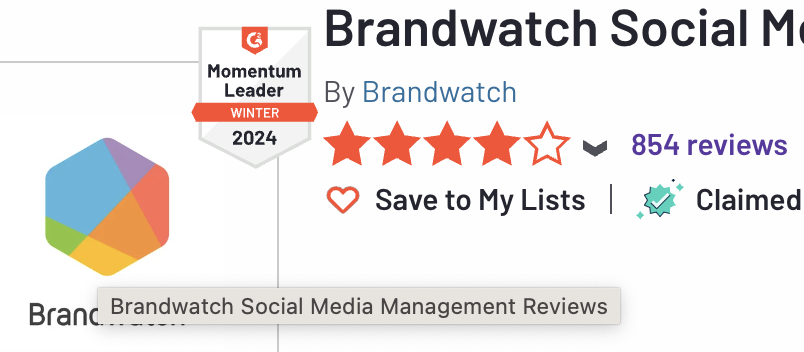
Sprout Social alternative #9: Emplifi
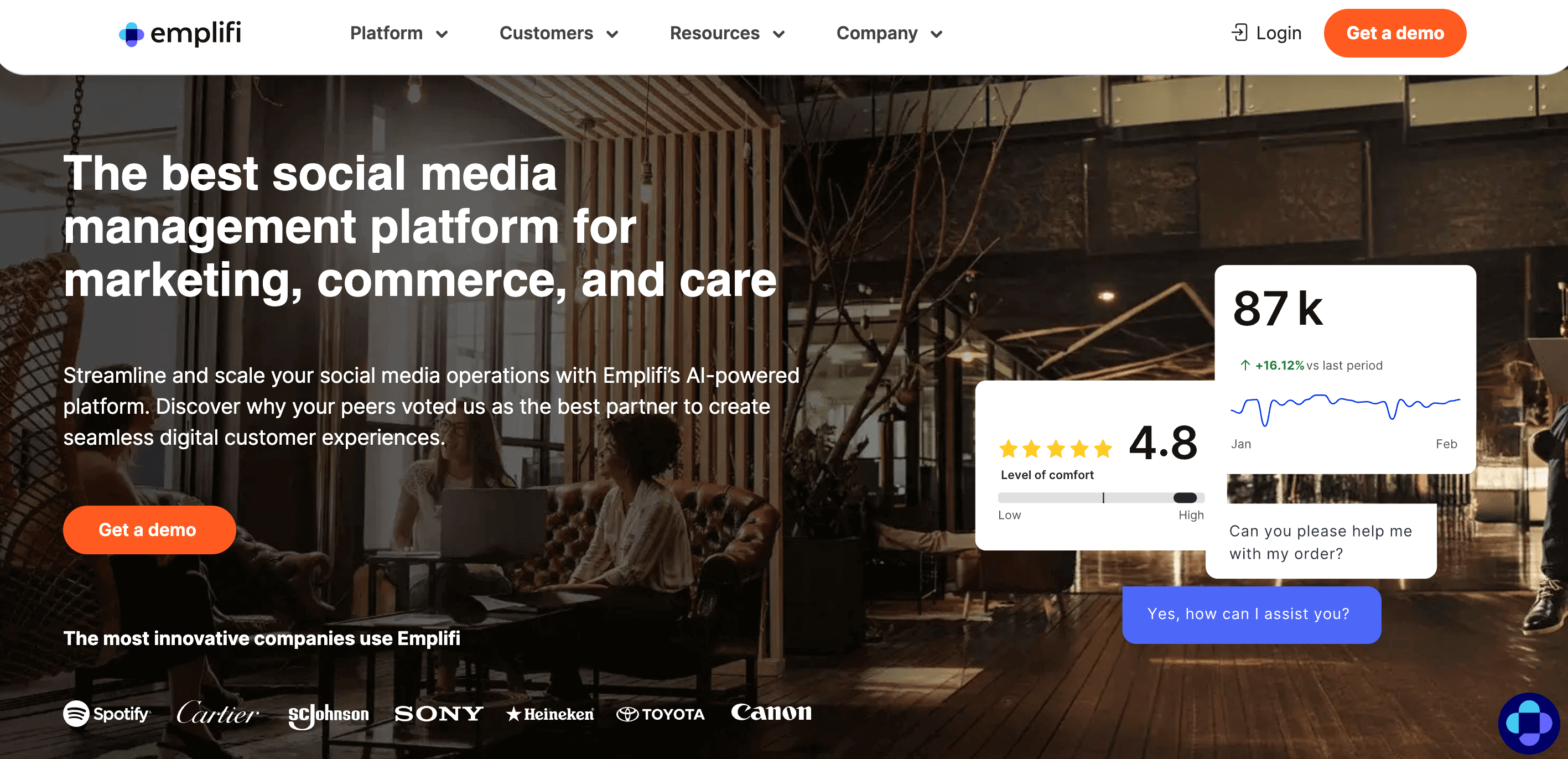
Emplifi has emerged as a cutting-edge alternative to Sprout Social in 2024, leveraging advanced artificial intelligence to provide a unified platform for comprehensive social media marketing. The platform has significantly enhanced its AI capabilities, offering predictive analytics for content performance and automated personalization at scale.
Also Read: Accelerating Your Social Media Growth with AI Content Generators
Emplifi’s focus on top-of-funnel marketing has expanded to include middle and bottom-funnel strategies, providing a holistic approach to the customer journey. In response to the growing importance of social commerce, Emplifi has introduced advanced shoppable UGC features and integrations with major e-commerce platforms.
| Features | |
| AI-powered content hub with performance prediction | Smart publishing with cross-platform optimization |
| Unified inbox with AI-assisted response suggestions | Advanced social listening with trend forecasting |
| Enhanced shoppable UGC with AR try-on capabilities | Multi-dimensional sentiment analysis |
| Customizable dashboards and feeds | AI-powered chatbots with natural language processing |
| Comprehensive analytics with attribution modeling | |
Supported social channels
Emplifi supports a wide range of social media channels, including:
Social media platforms
Platform integrations
Emplifi offers numerous integrations to help streamline your marketing efforts:
Platform integrations
| Pros | Cons |
| Contact management | Dashboard issues |
| Customization | Inadequate AI capabilities |
| Ease of use | Lack of features |
| Features | Slow loading |
| Helpful |
Pricing
- Custom pricing based on business needs and scale
Emplifi vs. Sprout Social
- AI Capabilities: Emplifi leverages advanced AI with predictive analytics for content performance and automated personalization, while Sprout Social offers standard analytics without predictive AI.
- Funnel Strategy: Emplifi covers top, middle, and bottom-funnel strategies, providing a full-funnel marketing approach, whereas Sprout Social focuses primarily on social engagement and analytics.
- Shoppable UGC: Emplifi includes advanced shoppable user-generated content (UGC) with AR try-on capabilities, ideal for social commerce; Sprout Social lacks these advanced shoppable features.
- Unified Inbox: Both platforms offer a unified inbox, but Emplifi enhances this with AI-assisted response suggestions, making it particularly useful for high-volume customer service.
- Social Listening: Emplifi provides advanced social listening with trend forecasting and multi-dimensional sentiment analysis, whereas Sprout Social offers standard social listening focused on engagement metrics.
- Integrations: Emplifi integrates with e-commerce and analytics tools like Shopify and Adobe Experience Cloud, supporting end-to-end social commerce, while Sprout Social supports CRM and basic analytics integrations.
Quick takeaway
Emplifi combines advanced AI-driven features with comprehensive social media management capabilities and custom pricing based on business needs. While it shines in AI-powered content prediction, social commerce features, and multi-dimensional sentiment analysis, it faces some challenges with dashboard functionality and loading speeds. The platform is well-suited for enterprise-level businesses seeking advanced AI capabilities and e-commerce integration in their social media strategy.
G2 rating

Sprout Social alternative #10: CoSchedule
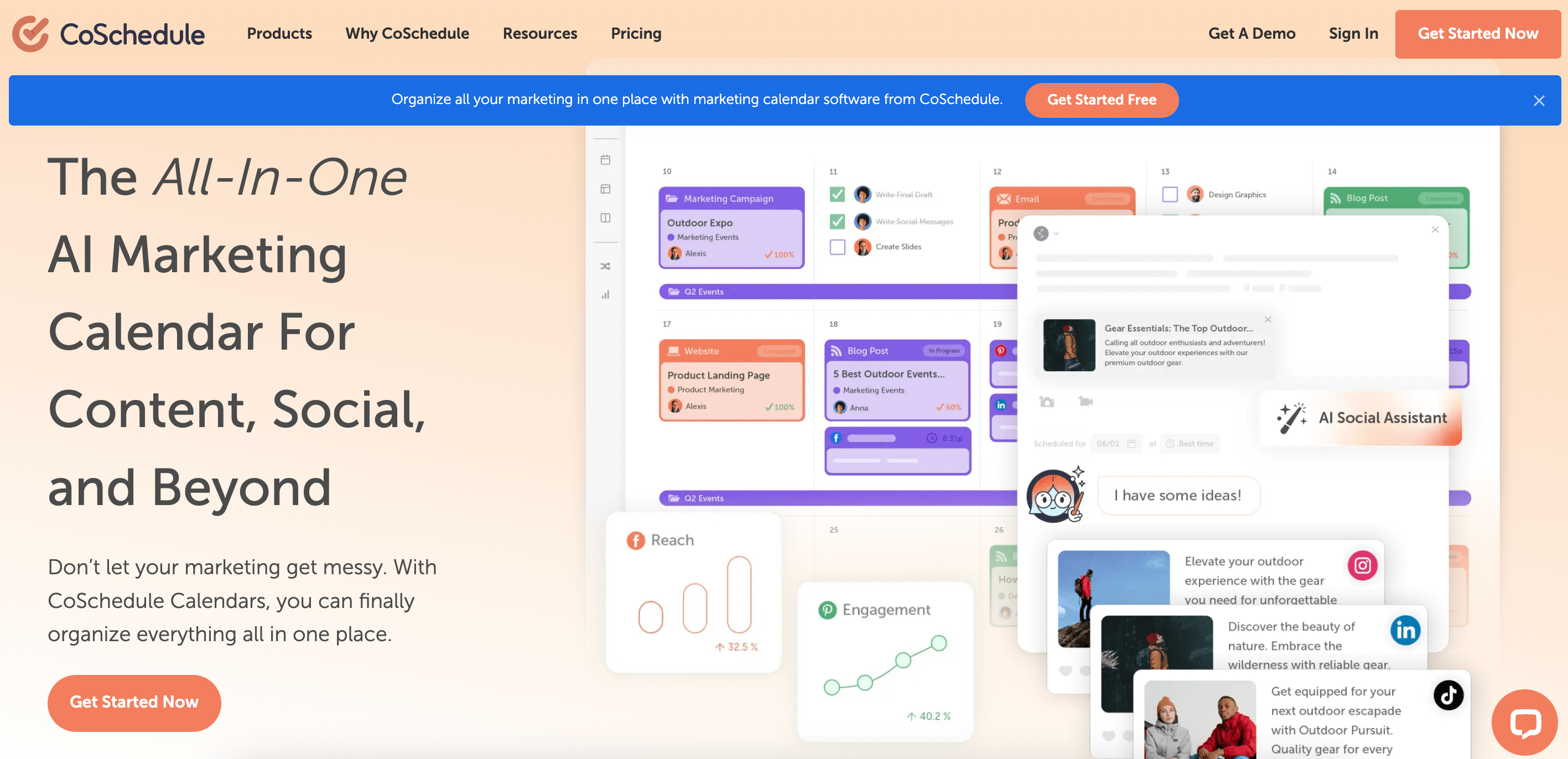
CoSchedule has solidified its position as a cost-effective Sprout Social alternative in 2024, particularly appealing to small teams and individual creators seeking streamlined social media management. The platform has evolved beyond its initial focus on content calendars, now offering a more comprehensive suite of tools that rival larger competitors. CoSchedule’s strength lies in its intuitive interface and ability to simplify complex workflows, recently enhanced with AI-powered scheduling suggestions and content optimization features.
In 2024, CoSchedule introduced a mid-tier plan to bridge the gap between its free and professional offerings, catering to growing businesses. The platform has also expanded its analytics capabilities, providing more in-depth insights into content performance across channels.
| Features | |
| AI-powered scheduling and publishing | Drag-and-drop content calendar |
| Team collaboration tools | Customizable workflows with approval processes |
| Automated content curation | Bulk scheduling with smart queue |
| Comprehensive analytics | Custom reporting |
| AI-generated suggestions | |
Supported social channels
CoSchedule supports a wide range of social media channels, including:
Social media platforms
Platform integrations
CoSchedule offers numerous integrations to help streamline your marketing efforts:
Platform integrations
| Pros | Cons |
| Affordable | Expensive subscription |
| Features | Integration issues |
| – | Poor customer support |
| – | Poor interface design |
Pricing
- Free Marketing Calendar: $0/month, which includes 1 user, 1 social profile, and AI Assistant
- Essential Marketing Calendar (new tier): $19/month, which includes 3 users, 3 profiles, social analytics, and reports
- Pro Marketing Calendar: $59/month, which includes 3 users, 5 social profiles, and social profile groups
- Marketing Suite – Custom pricing
CoSchedule vs. Sprout Social
- Primary Functionality: CoSchedule focuses on content organization and scheduling, while Sprout Social is a comprehensive social media management tool with advanced engagement, analytics, and CRM features.
- Content Calendar: CoSchedule’s visual content calendar is central to its platform, helping teams manage and organize all content efforts in one place; Sprout Social also has a calendar but prioritizes social media engagement and analytics.
- Target Audience: CoSchedule is designed for small teams, bloggers, and content marketers needing streamlined scheduling, whereas Sprout Social targets larger teams and agencies needing advanced social media management.
- Free Version: CoSchedule offers a limited free version with basic scheduling features, ideal for small teams or individuals, while Sprout Social’s plans start at a higher cost, reflecting its more robust feature set.
- Pricing: CoSchedule’s pricing structure is more budget-friendly for smaller teams, while Sprout Social’s higher-tier plans cater to agencies needing advanced analytics and reporting.
Quick takeaway:
CoSchedule offers an AI-enhanced social media management platform with a strong focus on content calendars and team collaboration. Plans start from free to $59/month. While it excels in content organization and provides affordable pricing, it faces challenges with customer support, interface design, and integration capabilities, making it most suitable for small teams and content marketers who prioritize scheduling and workflow automation.
G2 rating
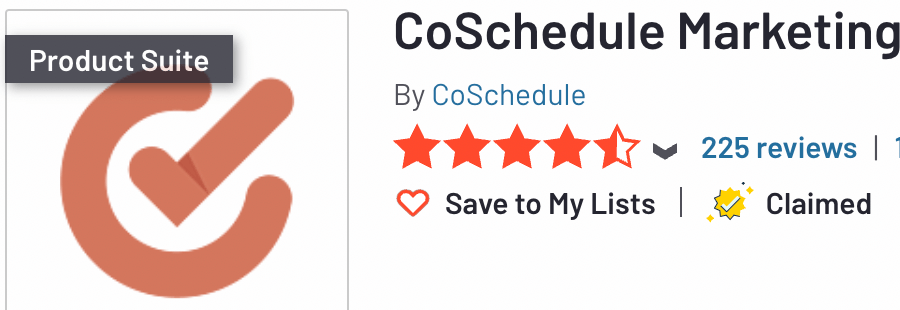
Sprout Social alternative #11: MavSocial
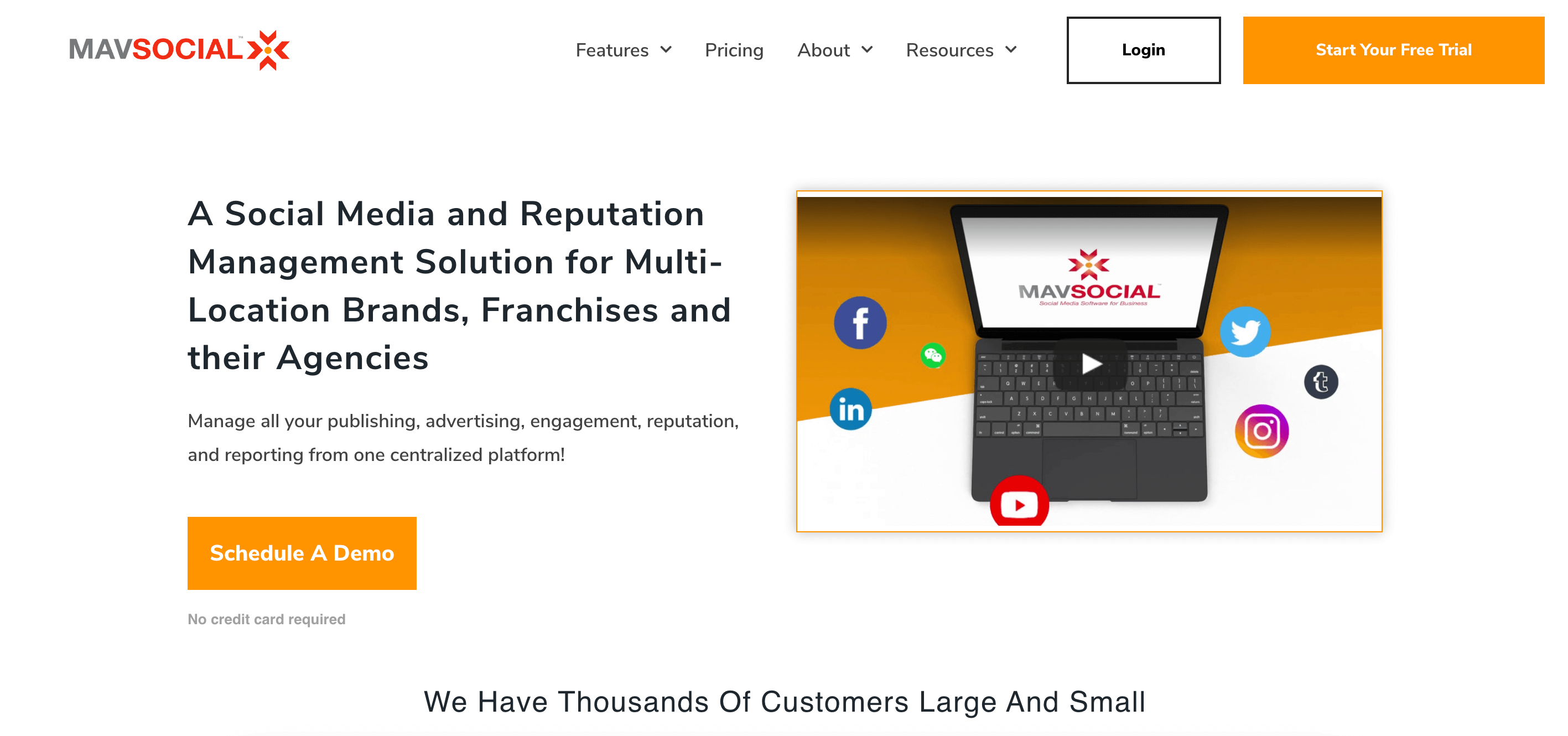
In 2024, MavSocial emerged as a robust Sprout Social alternative, offering a comprehensive yet cost-effective social media management solution tailored for brands and agencies. In 2024, MavSocial introduced AI-driven content recommendations and automated post optimization, elevating its value proposition in the competitive social media management landscape.
Recent updates include an improved content curation engine that leverages user engagement data to suggest high-performing content ideas. MavSocial has expanded its advertising capabilities, offering advanced audience targeting and campaign optimization tools across multiple platforms.
| Features | |
| AI-driven scheduling & recommendations (New!) | Engagement management & sentiment analysis |
| Smart content curation with predictions | Cross-platform AI ad optimization |
| Team collaboration & approval workflows | Custom analytics & ROI tracking |
| Visual content & asset library | Automated engagement optimization |
Supported social channels
MavSocial supports a wide range of social media channels, including:
Social media platforms
Platform integrations
MavSocial offers numerous integrations to help streamline your marketing efforts:
Platform integrations
| Pros | Cons |
| Ease of use | Content creation |
| Easy integrations | Content issues |
| Integrations | Improvement needed |
| Multi-platform | Interface issues |
| Multi-platform posting | Poor design quality |
Pricing
- Starter (new tier): $29/month with 1 user and 10 social profiles
- Pro: $78/month (slight increase, includes new AI features)
- Business: $249/month with 5 user accounts, 40 social profiles, and approval workflow
- Enterprise: Custom pricing (replaced fixed $399 plan)
MavSocial vs. Sprout Social
- Target Audience: MavSocial appeals to small teams and individual creators with essential, cost-effective tools, while Sprout Social targets larger teams and agencies needing comprehensive social management features.
- Content Recommendations: MavSocial offers AI-driven content recommendations and post optimization, focusing on engagement maximization; Sprout Social provides content suggestions without AI-driven optimization.
- Advertising Capabilities: MavSocial includes cross-platform advertising management with advanced audience targeting and campaign optimization, while Sprout Social lacks dedicated advertising management tools.
- Analytics: Both platforms provide analytics, but MavSocial’s suite includes ROI tracking and competitor benchmarking, whereas Sprout Social emphasizes audience insights and competitor analysis without ROI tracking.
- Content Management: MavSocial includes a visual asset library for streamlined content management, ideal for teams needing centralized digital asset organization; Sprout Social lacks a dedicated digital asset library.
- Pricing: MavSocial’s starter plan is more budget-friendly at $29/month, while Sprout Social’s pricing reflects its advanced analytics and engagement features, starting at a higher rate.
Quick takeaway
MavSocial provides a comprehensive social media management platform with AI-powered features starting at $29/month, with a strong emphasis on content optimization and advertising management. While it excels in ease of use and multi-platform integrations, it faces some challenges with content creation and interface design, making it best suited for small to medium-sized teams looking for an affordable yet feature-rich social media management solution.
G2 rating
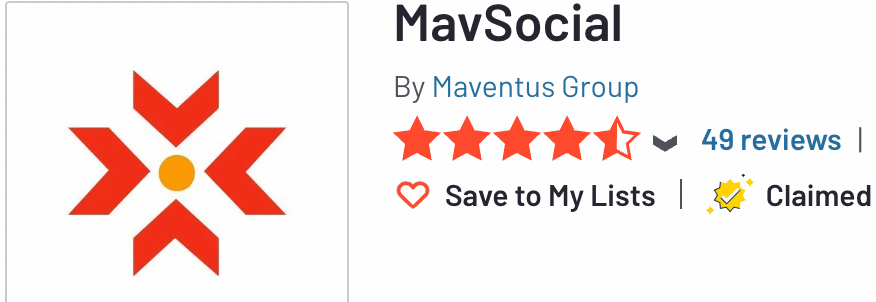
Sprout Social alternative #12: Zoho Social
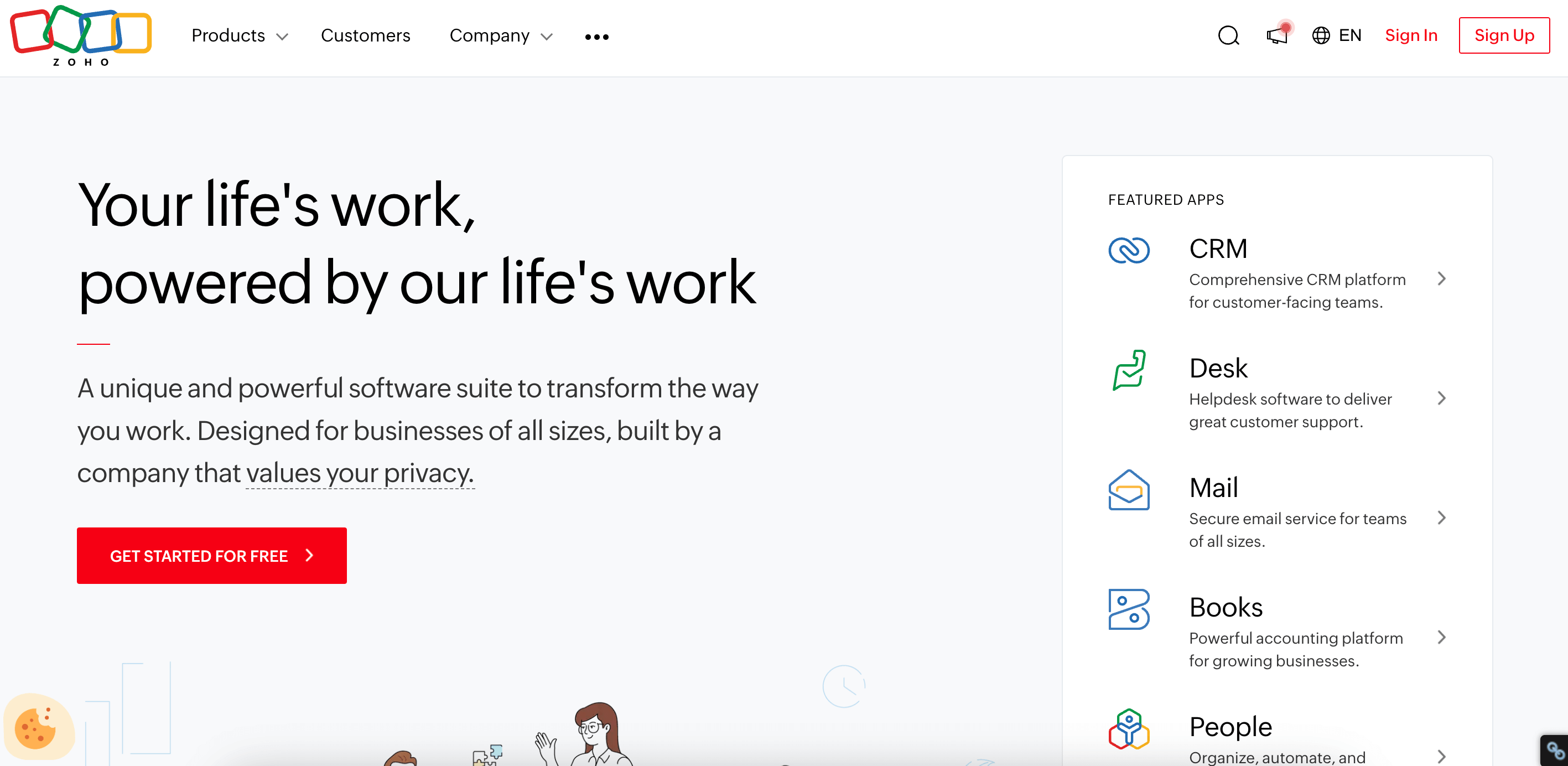
Zoho Social has strengthened its position as a compelling Sprout Social alternative in 2024, particularly for small and medium-sized businesses (SMBs) and agencies. The platform has expanded its capabilities, introducing AI-driven insights and predictive analytics while maintaining its user-friendly interface and affordable pricing structure. Zoho Social’s recent updates focus on enhancing its monitoring tools and reporting features, providing users with more comprehensive and actionable data to inform their social media strategies.
In 2024, Zoho Social introduced an advanced sentiment analysis feature that works across multiple languages, allowing businesses to better understand and respond to customer sentiment in real-time.
| Features | |
| AI-driven scheduling & recommendations (New!) | Real-time monitoring |
| Multilingual sentiment analysis | Team collaboration |
| Approval workflows | Lead ads management |
| Advanced analytics & custom dashboards | Predictive performance insights |
| Social listening | Automated post optimization |
Supported social channels
Zoho Social supports a wide range of social media channels, including:
Social media platforms
Platform integrations
Zoho Social offers numerous integrations to help streamline your marketing efforts:
Platform integrations
| Pros | Cons |
| Ease of use | Lack of features |
| Post scheduling | Missing features |
| Social media management | Social media limitations |
| Social media integration | Centralized mmanagement |
| Centralized management | Expensive |
Pricing
- Standard: $10/month with 1 brand (11 channels) and 1 team member (slight increase, includes new AI features)
- Professional: $30/month with 1 brand (11 channels) and 1 team member
- Premium: $40/month with 1 brand (14 channels) and 3 team member
Zoho Social vs. Sprout Social
- Free Plan: Zoho Social offers a free plan for up to seven social accounts, while Sprout Social does not have a free option, making Zoho more budget-friendly for small businesses.
- Reporting & Analytics: Sprout Social provides advanced analytics with competitor benchmarking, while Zoho Social offers basic analytics suitable for foundational insights.
- Integrations: Zoho Social integrates seamlessly with Zoho CRM and other Zoho products, while Sprout Social supports integrations with various third-party CRMs and tools, providing more flexibility.
- Pricing: Zoho Social offers lower-cost plans, appealing to small businesses, whereas Sprout Social’s higher starting price reflects its advanced analytics and team features.
- User Experience: Sprout Social’s interface is polished and intuitive, ideal for teams, while Zoho Social’s simpler interface caters to individuals and smaller teams.
Quick takeaway
Zoho Social is an affordable Sprout Social alternative with AI-enhanced features, starting at $10/month for the Standard plan and offering a free option for up to seven accounts. While it excels in ease of use and integration with other Zoho products, particularly Zoho CRM, it has some limitations in features and centralized management, making it ideal for small to medium-sized businesses seeking a cost-effective social media management solution.
G2 rating

Sprout Social alternative #13: Statusbrew
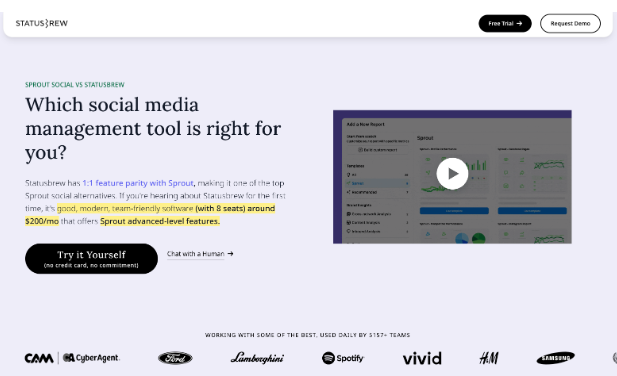
Statusbrew is a modern, flexible social media management tool that offers 1:1 feature parity with Sprout Social at a significantly lower investment. Designed for agencies and growing teams, it brings scheduling, engagement, reporting, and collaboration together into one unified platform—making it a practical and cost-effective Sprout Social alternative.
Unlike many tools that charge per user, Statusbrew follows a bundled pricing model, making it more scalable for teams managing multiple brands or clients. With automation for moderation, customizable reports, and advanced inbox filtering, Statusbrew helps you stay on top of every social interaction without the clutter.
Whether you’re managing DMs, ad comments, or reviews, Statusbrew ensures your team can respond, collaborate, and report—faster and with more control.
Top features
- Content scheduling and publishing
- Inbox 60+ automation and macros
- Sentiment-based filtering and tagging
- Team collaboration and internal notes
- 230+ KPI tracking with customizable dashboards
- Create custom reports, schedule them, or share via shareable links
- Social listening for Reddit, Instagram, X (Twitter), Web (blogs & news sites)
Supported social channels
Supported social channels
Platform integrations
Platform integrations
Pros & Cons
| Pros | Cons |
| Unified inbox with rule-based automations | No evergreen content recycling |
| Team-specific inboxes and user assignment | Social listening limited to select platforms |
| Highly customizable reporting templates | |
| Fair pricing with no per-seat charges |
Pricing
- Standard: $129/month for 5 users, 10 profiles
- Premium: $229/month for 8 users, 15 profiles
- Enterprise: Custom pricing
- 14-day free trial included
Statusbrew vs. Sprout Social
Reporting & Analytics: Both offer deep reporting, but Statusbrew allows more dashboard customization with 230+ KPIs and scheduled delivery features.
Inbox Management: Sprout Social provides a Smart Inbox, while Statusbrew allows inbox automation, team assignment, macros, and internal notes.
Collaboration: Statusbrew includes approval workflows and sharable calendars built for agency-client collaboration.
Pricing: Statusbrew offers bundled pricing (e.g., 5 users at $129/month) vs. Sprout Social’s $249/user/month model.
Listening Tools: Sprout has broader web listening, while Statusbrew covers Reddit, Instagram, X, and blogs & news sites.
Quick takeaway
Statusbrew is a top alternative to Sprout Social for teams that require robust collaboration tools, custom reporting, and advanced automation without the per-user pricing costs. It’s best suited for agencies and brands that manage high message volumes or work closely with clients across multiple social media profiles.
G2 rating:
Sprout Social alternative #14: Nuelink

Nuelink is a modern social media management platform built for creators, entrepreneurs, and growing brands who want powerful automation and bulk scheduling without the complexity or high cost of enterprise tools like Sprout Social.
The platform simplifies the entire publishing workflow with features such as bulk scheduling for months of content, powerful automation, RSS-to-social posting, AI-assisted post creation, link-in-bio pages, and a unified scheduling dashboard for all major platforms.
Nuelink’s biggest advantage is its automation engine, which eliminates repetitive tasks and turns your content distribution into a set-and-forget system. Users can import content from blogs, podcasts, YouTube, Shopify, Etsy, or Notion and automatically publish across their social channels with consistently branded templates.
Nuelink works exceptionally well for small businesses, social media managers, solopreneurs, and agencies looking to save hours each week. It also supports link-in-bio pages, social inbox, workflow management, and detailed analytics that give users everything they need to grow consistently across platforms.
Top features
- Bulk scheduling and auto-posting
- Unified social inbox
- Multi-platform scheduling
- Content recycling and evergreen posting
- Instagram feed & Reels scheduling
- Media Library
- Automation recipes (blog → social, podcast → social, Shopify, Etsy, etc.)
- AI caption and hashtag generator
- Link-in-bio pages (NueBio)
- Analytics and reporting
- Calendar, Grid, Feed, and List views
- Import from RSS, Notion, YouTube, Shopify & more
Supported social channels
Supported social channels
Platform integrations
Platform integrations
| Pros | Cons |
| Powerful automation engine | No advanced social listening |
| Bulk scheduling for months | Limited competitor tracking |
| Easy UI for beginners | Smaller ecosystem than Sprout |
| Affordable pricing | Reporting less advanced than enterprise tools |
| Unified Inbox | No TikTok DM support (platform limitation) |
| Great for creators & SMBs | — |
Pricing
- Free trial: Fully featured 14-day trial
- Paid plans: Start at $18/month
Nuelink vs. Sprout Social
Primary focus
Nuelink focuses on automation, bulk scheduling, content recycling, and simplifying multi-platform posting.
Sprout Social focuses on enterprise-level analytics, social listening, and customer support features.
Publishing & scheduling
Both platforms offer strong scheduling tools.
Nuelink gives more flexibility for bulk imports, evergreen posting, and automation workflows, making it ideal for users who want to “set it and forget it.”
Analytics
Sprout Social provides deeper enterprise analytics with competitor insights and advanced audience reports.
Nuelink offers essential growth analytics, performance tracking, and simple exportable reports.
Collaboration tools
Sprout Social wins here with team tasking and enterprise workflows.
Nuelink provides simple collaboration, but its primary strength is efficiency and automation, not heavy enterprise workflows.
Engagement tracking
Sprout Social has a robust Smart Inbox with filtering and team routing.
Nuelink offers a Unified Inbox for comments and messages, great for creators and SMBs, but not as complex as Sprout’s enterprise suite.
Pricing
Nuelink starts at $19/month, making it dramatically more affordable than Sprout Social’s $249/month plans while still covering core scheduling, automation, inbox, and analytics needs.
Quick takeaway
Nuelink delivers a powerful automation-first alternative to Sprout Social at an accessible price starting at $19/month. It excels at bulk scheduling, automation, multi-platform publishing, and content repurposing, perfect for creators, small businesses, and lean teams.
While it doesn’t offer enterprise-level social listening or advanced competitor tracking, it’s unbeatable for users who want to automate their content pipeline, simplify posting, and grow consistently across platforms without the heavy cost or complexity of Sprout Social.
G2 rating
In Conclusion
We’ve explored the leading social media platforms and showcased the best alternatives to Sprout Social, breaking down key features, pricing, and essential details to make your decision easier.
These social media management tools are designed to meet the needs of businesses of all sizes. Many of them also come with a free trial, allowing you to explore without any upfront commitment.
So, which Sprout Social alternative will you try first?
The easiest way to manage and grow your social channels.
Try ContentStudio for FREE
FAQs
1: How do AI-powered features in Sprout Social alternatives compare to Sprout’s offerings in 2024?
ContentStudio has made significant strides in AI integration, offering advanced AI-powered content suggestions and optimal posting times that rival and sometimes surpass Sprout’s AI capabilities.
2: What are the key factors to consider when choosing between Sprout Social and its alternatives?
Key factors include pricing, ease of use, analytics depth, AI capabilities, and integration options. AgoraPulse stands out for its excellent team collaboration features and top-notch customer support, which are crucial for many businesses.
3: Are there any industry-specific Sprout Social alternatives that cater to niche markets?
MeetEdgar is particularly well-suited for content creators and small businesses, offering unique features like content categorization and automated recycling that cater to those who need to maintain a consistent social media presence with limited resources.
4: How do the analytics capabilities of Sprout Social alternatives compare to Sprout’s in 2024?
ContentStudio provides in-depth, customizable reports and real-time analytics that match or exceed Sprout’s offerings, especially in terms of content performance and audience insights.
5: Can Sprout Social alternatives integrate with e-commerce platforms for social commerce?
Yes, AgoraPulse offers robust integrations with major e-commerce platforms, facilitating seamless social commerce operations and allowing businesses to manage their social selling directly from the platform.
6: How do the pricing structures of Sprout Social alternatives compare to Sprout’s for small businesses vs. large enterprises?
MeetEdgar offers a more flexible pricing structure than Sprout, providing plans suitable for solo entrepreneurs to small businesses at a lower cost while maintaining a competitive feature set focused on content scheduling and recycling.
7: What are the latest features introduced by Sprout Social alternatives that Sprout doesn’t offer?
ContentStudio has recently introduced an AI-powered content repurposing tool and a unified content calendar for blog and social media planning, features not currently available in Sprout Social.
Experience organized workflow with a unified social media management platform for agencies.
Try ContentStudio for FREE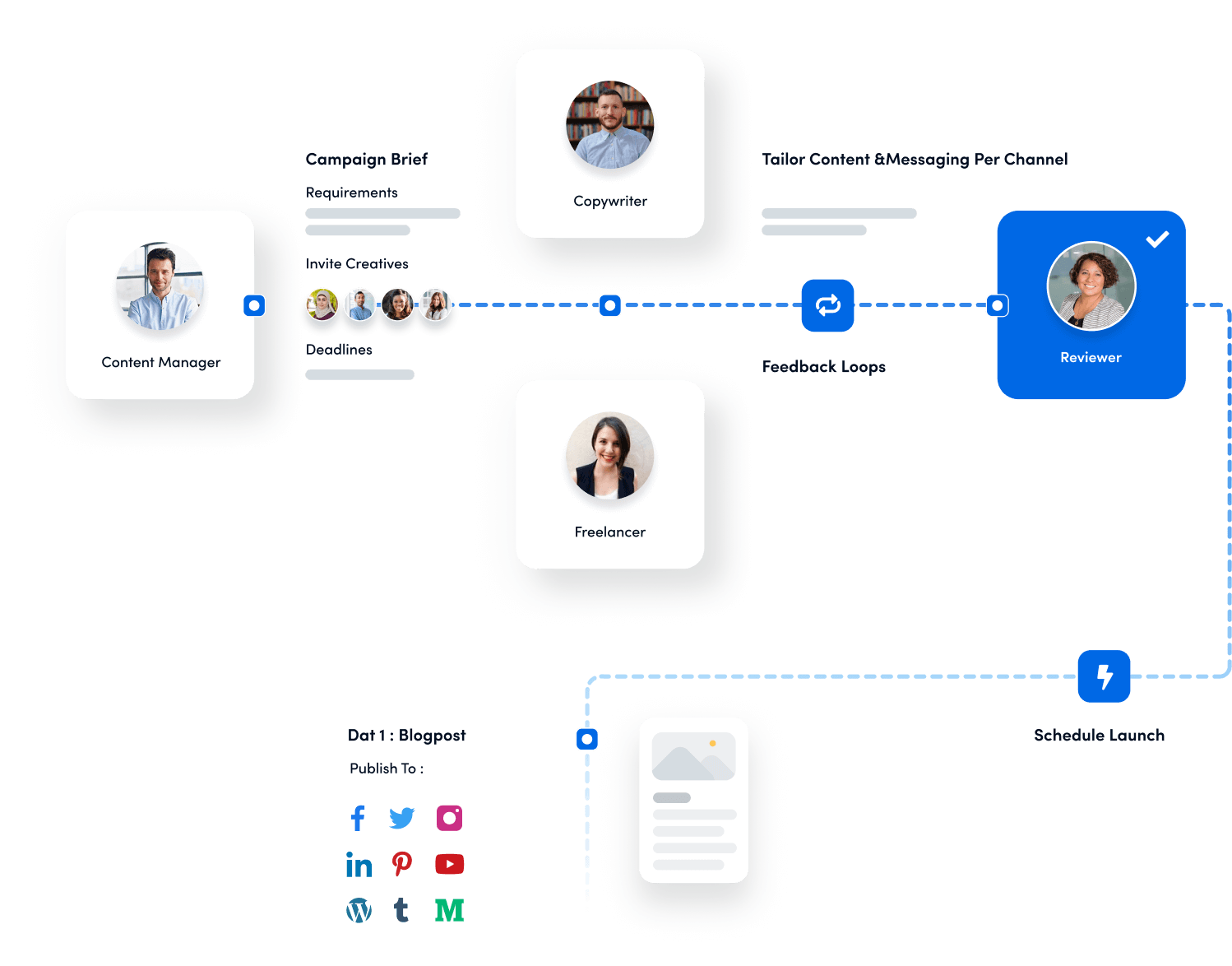
Recommended for you

Evergreen content: How to create Long-lasting traffic for your website

6 proven ways to build backlinks with content marketing for SEO


Powerful social media management software
14-day free trial - No credit card required.

